#nisio meta
Photo

Cipher Academy, Chapter One Thoughts.
As I’ve said several times Medaka Box is my favorite manga ever, and Nisioisin my favorite author so I was excited for Nisio to be writing another manga in Shonen Jump Magazine. At first I was waiting to see if the manga would make it past fourteen chapters before writing meta on it because I didn’t want to look stupid writing meta on a series that got cancelled early, but my friend @kaibutsushidousha encouraged me to just go ahead and look stupid anyway so here we go. My goal is to go chapter by chapter and catch up with chapter seven by next week. So, here we go.
Nisioisin writes good protagonists, and the first chapter if anything does the work of establishing both Irohazaka’s personality as well as his main flaws. More on this underneath the cut.
1. The Token Boy
If you haven’t noticed Nisio has a habit of writing harem series, which are also a common format in Shonen Jump. Usually these series depict one boy surrounded by girls with several of them having romantic feelings for him. Nisio is well aware of these tropes and instead of playing them straight he tends to subvert them. Medaka Box is nothing if not an analysis and subversion of the entire battle genre. The first episode is both a look at the kind of personalities the main characters of these harem series tend to have, and also a subversion.
Due to the fact that most of these series where one male main character is surrounded by girls are written not with female readers in mind but to appeal to male readers, mostly as a romantic fantasy, the main characters are basically generic, milquetoast, wishy-washy, characters who do not have personality traits because they are meant to be easy for readers to insert themselves into. Like Bella Swan, but for boys.
Irohazaka starts with several traits of these wishy-washy male main character. In the first place he presents himself as the most untalented member of his class. He joined the academy witout any big dreams unlike the rest of his class. He seems to be confused and thought Cipher Academy was just a regular high school before joining. He apparently joined a school for code deciphering and puzzle solving despite the fact he has never solved a crossword in his life.
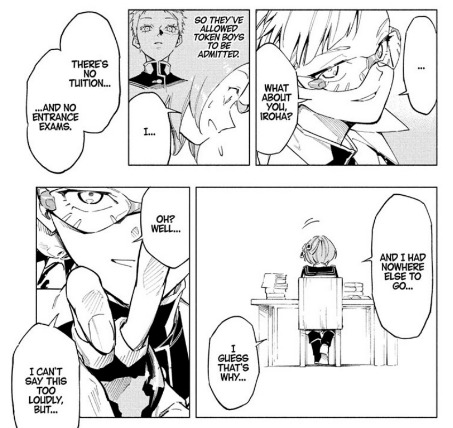

Unlike the other students he basically has no motivation, he cannot solve the introduction crossword puzzle because he does not have a reason he came to this school. He is in almost every way an average high school student surrounded by more extreme personalities.


Tohshusai treats him like he does not exist, she cannot even remember that they were in the same class. She even outright calls him the token male main character.

Tokenism of course meaning the making of a perfunctory or symbolic effort to do a specific thing, especially by recruiting a small number of people from underrepresented groups to give the appearance of sexual or racial equality in a workforce. Essentially saying that Irohazaka both does not belong in the class, and was not admitted because he himself has any merit.
This resembles the protagonist that are so typical of the genre after all, harem protagonists somehow attract a lot of girls without really any effort, they don’t pursue the girls the girls pursue them, they don’t really have anything special about them, no talents, they barely even have personalities. Just like Iroha is accused of being the token male student, they are more or less token male main characters.
Iroha even seems to be basically handed a device that will allow them to cheat at solving puzzles for basically doing nothing, just helping a female students hide for five minutes. However, Iroha’s not really having the puzzles solved for him, just receiving help from a friend, something that the teacher establishes right away isn’t a bad thing. Even the fact that Iroha has little knowledge solving puzzles doesn’t really have to count as a mark against them, after all they are at a school they are here to learn.
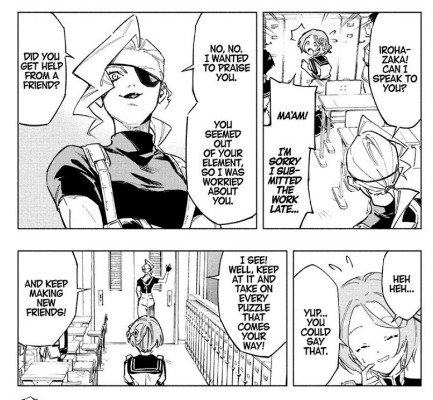
Iroha then carries on this theme of making friends and choosing your friends when three other girls gang up on them and try to pressure them into giving up the location of the girl they were searching for earlier.
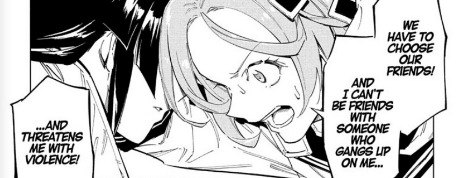
The glasses that Iroha are given also do not solve the puzzle for them, but rather just gives them hints and clues. They’re not cheating, just receiving help from a friend. Iroha still has to solve the rest of the puzzle on their own. Which is something we see earlier Iroha isn’t a lazy student, when they had trouble solving the crossword puzzle cryptogram they were working at it for hours, and had several books open in the attempt to solve it on their own.
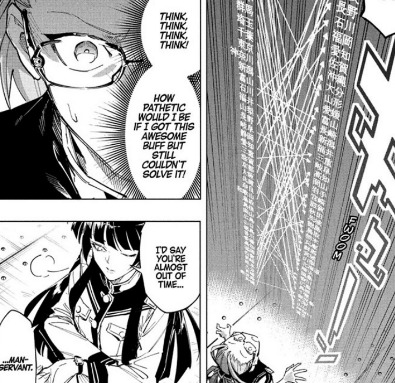

They’re clever enough not only to figure out the rest of the puzzle after being given a hint, but they also realize it was a trick question that was set up on the assumption that Iroha would take the easy way out and just try to guess randomly one of the three girls present rather than just solve it on their own.
The manga starts with both everyone seriously underestimating the protagonist, and on top of that assuming they’re incompetent and spineless only to show that the protagonist both has a spine and makes choices on their own, they choose who to be friends with rather than being bullied into the choice, they’re also capable of solving the puzzle. The problem of having bland main characters is not really exclusive to harem series, Shonen manga in general are known for having power of friendship main characters who everyone likes and are automatically good at everything they try. In fact Nisioisin’s last series Medaka Box basically spent the entire time mocking such a main character. Often when reading shonen manga we end up asking ourselves “Why are we following around this loser? Why does everyone like them so much?”

So, this entire first chapter does the work of establishing both why Iroha is the main character, and how in a class of geniuses, eccentrics and weirdoes they’re still someone capable in their own right.
25 notes
·
View notes
Text
L Lawliet: a deep dive into the expanded universe pt.01
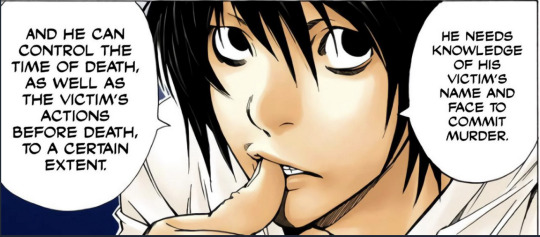
EDIT (07/04/2024): Added some imgs.
Apologies for being so late to give this a follow up to @maevearcher's meta which can be found here and here. As usual, she’s made excellent points and I'll try to answer the ones which caught my eye.
Since this post ended up gaining a life of its own and becoming a bit too long, I’m splitting it in 2 or 3 parts. The core of the content for part 01 starts after under the button to Read More.
Here we talk about L's humanity.
I'll start with a disclaimer of my own: while I consider the manga as the base for the story, I'm very much open to the expanded DN universe as a complementary study of the characters and their motivations — sometimes even filling in the blanks for some of the background mysteries, such as the dynamics of Wammy's House and how L's successors view him.
To further clarify: by canon I mean the manga and any works by Tsugumi Ohba as the base material. I think @maevearcher and I are more or less in agreement on that, from what she mentioned in her own posts. As she said, the written word is indeed the baseline truth.
The expansion of the DN universe also has its own very special set of problems; for example, in many ways, L:CtW (L: Change the WorLd) commits the sin of overindulgence by throwing in considerations that, arguably, go against canon. Besides the ending where L lives for a final 23 days and Watari dies, the portrayal of Near in the movie (though in the novel he's also walking a fine line between becoming partially and very much OOC) is also a point of contention. I confess that I really wasn't fond of the way they portrayed Misa as a potential crush of L given canon insights on his opinion about Light whether in the role of Kira or as a person (pg.64 of Vol 13: How to Read, henceforth referred to as V13:HTR), but aligning L to become more humane and forgiving was at least interesting.
The same happens with the live action movies, the 2015 series, and the musical. At least the game Spiraling Trap isn't clashing with canon elements — that I could tell. The main plot is separate from the events of DN and the dating sim is a little slice of heaven into L's thoughts and emotions which I dearly love.
However, while L:CtW does indeed overindulge, the novel AN:LABB (Another Note: LA BB Murder Cases) gives us a singular glimpse into L through the eyes of Mello while keeping the events mostly accurate to the main plot, even with its slight deviations. It's certainly an optional perspective to the core of DN, but one that I always found very insightful. In V13:HTR, Obha mentions how he would’ve liked that there were more novels about L and how he solved previous cases, in a similar fashion to how Nisio Isin approaches AN:LABB. Here’s what Ohba says in pg.61 of V13:HTR:
(...) I didn’t think up much for [L’s] past. For him to be in such an influential position, he must have solved an amazing amount of cases, but I have no idea what kind of cases they were or how he solved them. But I would love for NISIOISIN, who wrote the Death Note novel, to write more stories about that (...)
This means that, to some extent, even the original author, Ohba, accepts AN:LABB as close to canon — or rather, as canon as it can get given the creative liberties allowed to a third party writer. To that point, Nisio Isin took L’s capoeira demonstration during the Yotsuba arc and made it a whole thing in the novel, with L taking inspiration from Naomi Misora’s skills. However, given the importance of that event, in the main story, L takes a while to even remember Misora so we can infer that either the stress of the case is getting to him OR learning capoeira and subsequently Misora’s role in it didn’t leave that much of an imprint on him because true canon didn’t really put that much emphasis into it. Either way, it’s an extrapolation that works. The technicalities can be overlooked given how ambiguous the scene is, as there is more than room to deduce a different past.
At the same time, I am an apologist that there are shared characteristics to L throughout the different mediums. My own interpretation of L's character has the manga as a baseline, but the expanded universe has taught me that there are sides to him that might not be so easy to perceive in dialogue bubbles or illustrations alone. Little things like L's addictive personality or the way he represses feelings are visible in the manga but caught beautifully in the novels, for example.
Going from the written word into the screen also represents a loss of the purity achievable only within the narrative in-book, where you can extrapolate and reach your own conclusions without being subject to the bias of sound and movement — though manga aggregates the visual to words and with it an altogether different dimension of meaning. That's one of the many things I enjoy about elements of fiction introduced through books; the stillness of the images and the narrative are more complex. Every time the baseline gets adapted, it loses something or that something shifts to fit into the perception of others. It ceases being pure and its essence is fundamentally shattered. Like the concept of a musical score on paper that gets played by an orchestra, there will never be an adaptation as good as the source material because it breaks the illusion.
While I can certainly extrapolate and accept the loss, I find that the written word from the novels, the tone of a VA's voice and the body movements in a live action still complement the manga well, despite narrative clashes.

About L’s humanity
Recently I've been re-watching the anime and it's incredible how Alessandro Juliani's understanding of the character resulted in such a well-rounded voice for L. I actually prefer the EN version to the JP because of the voice acting. It's superbly brilliant, even if L becomes less listless. He's certainly still aloof, but his aggressiveness is portrayed more vividly; in contrast, L in the manga feels a bit more dangerous and scary to me due to the range of expressions that the anime didn't manage to add in due to time and budget constraints. If anything L tones down how dangerous he can be. He does this on purpose so that he can trick and trip his adversary, as can be seen during his earlier interactions with Light. At times, L makes a mockery of himself, apparently placing himself in the position of a more demure individual while sharply observing the world around him and forming conclusions.
As to @maevearcher ‘s first point:
(...) An image of this lonely autistic genius, locked inside the confines of his ways, waiting for the right person to come along and save him from the banes of his solitary existence…until he meets Light and realises there’s someone out there who he can relate to, for understanding and stuff. I personally don’t buy too much into that.
The depth to which L relates to Light can be overestimated, but not without reason. Theirs is mostly an adversarial relationship with varying deviations throughout the expanded universe, but if we solely consider the manga then we get this comment from Ohba regarding whether L has any friends on pg.64 of V13: HTR:
Nope. And when he says that Light is his first friend that’s a big lie. He never considers him a friend. He probably secretly thinks really negative things about him.
During the Yotsuba arc, L is at a disadvantage. Light has turned the tables, tricked him into what Beyond Birthday could not do and thus gained a solid position into rendering L almost powerless to charge him. To elaborate on the latter point: BB wanted to create the perfect, unsolvable crime to humiliate L, making him lose, and thus “spend the rest of his life trembling in fear of B’s shadow” (pg.163, AA:LABB); L would know who the guilty party was but wouldn’t be able to prove it or bring that person to justice. As such, L would not be able to solve the mystery. At the end of the novel BB fails due to Misora’s quick thinking and that’s that. However, Light has several advantages that BB lacked, starting with his own social position, charm and the impeccable reputation of a model student and the prized son of a police chief who helps solve cases every now and then.
We can argue that, what truly happens in manga canon, is L and Light showing how much they respect each other for their detective skills, forming a sort of strange kinship within the cat and mouse game, especially when Light loses his memories of the Death Note. The game thrills them and they enjoy pushing each other’s buttons. No one else has ever challenged them like this. That being said, the first time they meet up for coffee after the tennis match, L is observing Light like a hawk, keeps testing him for a reaction and seems somewhat irritated at how much Light talks. I would venture a guess that L doesn’t actually like Light that much, even when he loses his memories. He might even find Light a nuisance when he waves the flag of morality — though this is a common problem L is confronted with when dealing with the Task Force, in particular Chief Yagami and Aizawa. This also places him at another gruesome disadvantage, as he’s surrounded by people who openly dislike and criticise his methods. The Task Force is also extremely wary of the way L pursues Light and think he’s being stubborn without proof to substantiate his reasoning. Ironically, it’s Aizawa, one of L’s most critical subordinates, who initiates Light’s downfall years later once he starts to consider L’s suspicions in light of Near and Mello’s tactics.
Both L and Light respect the game, no matter where it takes them. I would further make an educated guess that Light even preyed on L’s vulnerabilities during the Yotsuba arc, predicting how L might fall into depression for failing at the game. Light was more than capable of understanding that L’s competitive and childish side would make him a sore loser, especially given that he had already “lost” the first round of battles just by showing his face. Even if there is a sliver of friendship between both during Light’s months of amnesia, it’s dead and buried the moment he becomes Kira again.
My conclusion here would be that, while what happened with Light was extreme, it was also somewhat similar to Beyond Birthday’s eternal enmity towards L: the challenge, the need to humiliate and take down the greatest detective, one of the most brilliant minds to ever walk the Earth. There are some notable quotes from AA:LABB that reference what it is to be L, surrounded by future challengers and individuals who both look up to L and want to prove they’re better than him:
Pg.69
By simple arithmetic, L's ability in 2002 was the equivalent of five ordinary investigative bureaus, and seven intelligence agencies (and by the time he faced off against Kira, those numbers had leapt upward several more notches). This is easy to think of as a reason to respect and admire someone, but let me say this as clearly as possible: that much ability in one human is extremely dangerous. Modern danger management techniques rely heavily on diffusing the risk, but his very existence was the exact opposite. In other words, if someone was planning to commit a crime, they could greatly increase their chances of getting away with it by simply killing L before they began. That was why L hid his identity Not because he was shy or because he never left the house. To ensure his own safety For a detective of L's ability, self-preservation and the preservation of world peace were one and the same, and it would not be correct to describe his actions as cowardly or self-centered.
Pg. 117
L was the goal of everyone in Wammy's House.
Everyone of us wanted to surpass him.
To step over him.
To step on him.
M did, N did, and B did.
M as a challenger, N as a successor.
B as a criminal.
Pg. 160:
B approached Naomi Misora, calling himself Rue Ryuzaki.
Rue Ryuzaki - L.L.
For anyone from Wammy's House, there could be no higher goal than identifying yourself with that letter - and Beyond Birthday seized this case as his chance.
One of the biggest problems with these quotes is that they paint a very complicated — and, ultimately, suffocating — picture of what it is like to be L. Ohba himself mentions Watari’s predisposition towards collecting geniuses from all over the world and what Wammy’s House has turned into, under the snippet for Watari’s character (pg.60 V13:HTR):
He’s a guy who cultivates detectives for fun. That’s kind of terrible, isn’t it?
Everyone profits from L. Watari becomes richer than ever. Wammy's House becomes breeding ground for geniuses who end up dreaming of a life where they enjoy constant thrill and challenge. However, in order to do so, the dream cannot be complete until the successor crushes the original; until M, N, B and A defeat L. At least one of L’s successors couldn’t handle the pressure and committed suicide. B, known as Backup, runs away from the orphanage and goes on a murder rampage. Having never met L in person, he deduces several personality quirks that the “original” demonstrates, going as far as exacerbating them in order to be creepy and repulsive. Mello, who boasts of having met L in person and being privy to stories about how he defeated several other detectives (then taking their aliases as a trophy) both fervently admires L and wants to step on him.
Step on him. That’s quite the turn of phrase. It does sound scary, doesn’t it? To be surrounded by people who would take the opportunity to pull you down, no matter how much they admire you. They want to be you, to prove that they’re better than you. It’s game and ego. Life and death. Winner and loser.
And that’s perhaps the most blatant summary in approved canon of what it is like to be L that we’ll ever get. We can, of course, argue that Watari cares about L. He’s not only his handler, but also the one who brought him into Wammy’s House. It’s fairly clear that he nurtured (and even enabled) some of L’s most distressing character traits, though I wouldn’t necessarily say it was with a purely utilitarian agenda. It’s perfectly acceptable to extrapolate how Watari might’ve wanted to keep L, a child of great intellectual genius, happy by allowing him to be challenged and properly educated. In fact, AN:LABB (pg. 145-46) even gives us L’s perspective on the kindness that justice can achieve, which is confirmed within the expanded universe to be similar to Watari’s teachings as L confronts Kujo in L:CtW.
"I have nothing to do with him," L said. "To be completely accurate, I do not even know B. He is simply someone I am aware of. But none of this affects my judgment. Certainly I was interested in this case, and began to investigate it because I knew who the killer was. But that did not alter the way I investigated it, or the manner in which my investigation proceeded. Naomi Misora, I cannot overlook evil. I cannot forgive it. It does not matter if I know the person who commits evil or not. I am only interested in justice."
"Only... in justice... " Misora gasped. "Then ... nothing else matters?"
"I wouldn't say that, but it is not a priority."
“You won't forgive any evil, no matter what the evil is?"
"I wouldn't say that, but it is not a priority."
"'But..."
Like a thirteen-year-old victim.
"There are people who justice cannot save."
Like a thirteen-year-old criminal.
“And there are people who evil can save."
"There are. But even so," L said, his tone not changing at all.
As if gently admonishing Naomi Misora.
“Justice has more power than anything else."
"Power? By power ... you mean strength?"
"No. I mean kindness."
He said it so easily.
Misora almost dropped the phone.
L
The century's greatest detective, L.
The detective of justice, L.
Who solved every case, no matter how difficult...
" ...I misunderstood you, L."
"Did you? Well, I'm glad we cleared that up."
I would, once again, venture another educated guess that, while Watari’s primary reasons for starting a program of successors to L was noble, it ultimately backfired on an individual level. Society wise, the letters, as L calls them in L:CtW, are a force for good. They solve crimes, help law forces around the world to keep peace. Some of them even become scientists like Dr Kujo — though she becomes the main antagonist in the spin-off novel. However, the pressure this kind of lifestyle fostered creates a group of individuals who are highly competitive and manipulative. Some, like A, can’t handle it. Even L has his own troubles, being called a reclusive sociopath, possibly by the police forces who treat him as a utility rather than a person. He’s someone they admire and resent, who is tolerated given how effective he is at cracking down cases.
This passage from L:CtW paints a grim picture of the way L suppresses his own feelings as he breaks down for not being able to prevent Maki from being kidnapped (pg. 150-51):
"Light...it hurts. My heart--"
It was a hurt that L Lawliet had suppressed, that he had to suppress in order to continue his existence as the peerless Detective L. How had the world's top detective been described in regard to facets of his personality rather than his ability as a detective? He had been called a kinky detective who relished bizarre murders, a human computer capable only of measuring mass murders in terms of cold numbers, a reclusive sociopath. What L thought of such estimations of his personality only L could know. But no one could truly understand L. How L did not and could not forget the faces of thousands of victims. Who could comprehend the man who had lived his life, and had to live confronting all the lives that ended prematurely, the tears of grief-stricken survivors, the devaluing of life as a daily reality. How was it possible to measure the pain of such a man? Was it a strain so heavy that L's back curved under all its weight?
Was it an agony so terribly to leave the indelible dark circles around his eyes? Was it a feeling so bitter that every bite he took needed to be coated in sugar? The chronically rounded shoulders, the inevitable dark circles, the eccentric tastes--L suppressed the pain of being a champion of justice, but the evidence of the pain was moulded into his very body.”
Even within the clear disparity from the official canon, this passage slaps. It humanises L further, making the detective become a person and not just a machine who is content with his lifestyle. I know there’s a tendency for those who prefer the manga to see L as someone who is unabashedly himself and perfectly alright with the life he lives. I would argue that the Kira case was not only the most difficult challenge L ever faced, but also a series of moments where he had to be at his best — and at his worst. He had to do everything within his power to solve the case, not only because of his pride but because of what he considers to be his sense of justice. Saying with such confidence ‘I am justice’ is a rather cheesy and childish thing to say out loud, though I read it as both what started as a child’s stubbornness and what L became, as he positioned himself as a barrier to prevent crimes.
L suppresses himself, represses his emotions; he tries to control them, as Fu Takashi says in an interview, he is “dependent on games or battles of the mind”. Perhaps this is a consequence of the foundations of his personality. Despite L’s innate stubbornness, it could be argued that this is as much his fault as it is Watari’s, who didn’t nurture L’s social skills as he should have when he was a child. By not having an outlet outside of his hobby, L is trapped in a prison of his own making. Superficially, L is a “smart guy who hates losing”, but what about the rest? What about the things that make him human, the connections with others? In the same interview, it is mentioned how L feels lonely and needs affection. But what affection can you get when you isolate yourself from the world and keep everyone at arm’s length? He’s not a machine. Even machines become obsolete with time, and need outside help to keep functioning.
As for the latter point, if everyone around L is trying to step on him, humiliate him and surpass him, then it’s only natural that his emotional defences would be up. Aside from Watari, whose loyalty he can count on, he’s alone. L has no one else. And everyone around him will have a dangerous, significant probability to betray him.
Next in part 02: About romance, having someone close and intimate, the meaning of the Monster speech.
Tagging @rinneroraito, @flametrashira and @sharkiethrts who might be interested in this meta.
#death note#l lawliet#death note meta#light yagami#spiraling trap#l lawliet headcanons#l lawliet x reader#watari#mello#mello death note#nate river#mihael keehl#near death note#beyond birthday#another note#l change the world#l death note#l lawliet death note
120 notes
·
View notes
Text
Nadeko only likes retro games but retro is a constantly shifting status that encompasses more games with time under the label as technology changes, one’s perception of what counts as retro can be partially locked to what year you were born, the PS2 and n64 is something some people would easily consider retro but others believe it’s only anything backwards from the famicon, many could firmly believe that the Atari era is where the retro limit ends.
The year monogatari takes place is non specific because it’s technically should be 2006-2007 but it’s always written as if it takes place in the current year, technically turning several monogatari characters into zoomers but not always shifting a characters traits sense, by getting sent into the future kanbaru becomes more technologically illiterate.
Other characters in a sense don’t need to make that change like araragi who’s always been a loner who kept away from all social including media. Hitagi adapts easily like she’s always done this connecting easily. Higasa entering her Twitter era doesn’t cause any issues as she became more prominent in later arcs instead of earlier arcs. Final example being Sodachi, who was introduced in an even later arc than Higasa but isn’t good with technology due to her past and present.
All these examples show that how a character adapts is partially dependent on how it fits into existing character details but will change if it fits the narrative. Nadeko clearly likes famicon era games but with the shifting era would Nisio consider it to be retro enough to superimpose it on to their character? I’d think he’d at least vauge about it (as he’s known to do), like:
————————————
Its interesting to set up my consoles in my new apartment, I couldn’t bring much but I wanted at least a few to play.
I thought this TV might be too new for a console this old but really all I needed was an adapter and all was well.
Ononoki chan showing up at my door with the cord was weirdly convenient. Maybe I mentioned it earlier.
Yotsugi leans over my shoulder to look at “Bats and Terry” (1987) for the Famicon.
Laying her head into the crook of my neck like a cat she says,
“It has less shapes than I remember.”
“Ah, that must be because it’s not on a CRT tv.”
Those really were more ideal.
“The box oneesan played it on was different I tell ya.”
“Hmm,
If not CRT or LCD then what?”
“It’s nothin complicated Nade-chan, I just watched tha’ show on an ipad.”
Ah, what a critical failure of assessment.
“Well I guess this one is too niche for a remake, I’m not really a modern gamer so it works out fine.”
“No this game is definitely modern.”
“Huh?”
“There’s nothing more topical and modern than this, ‘tennis for two is innovative even now’.”
“Those games are even beyond retro they’re over 50 years old!”
“But they’re derivative, nothing is more retro than the old ball and stick.”
“You mean the ball and sword?”
“Perhaps but jitsu tsuki ball came first.”
“Ah, are you perhaps thinking about RaRa Chan? I getsu.”
“Oh dear, you art right, I derived too much, I may even go back to the tree. Perhaps more is retro than I thought, good thinking Nadeko Chan.”
She nodded sagely, snugging closer she said.
“Finding what makes something retro is an arduous task ain’t it.”
She’s really sliding around accents for this bit,
“I suppose that it would depend on what you were born wouldn’t it?”
“What year were you even born?”
“Hmm, I didn’t give it in otori right? I suppose it’s-“
“Bzzzt!” She states, making an X over my face with her arms.
I hear myself die in game, I’m entirely bewildered.
“What was!-“
“You can’t state the year the story won’t make sense otherwise.”
This kind of meta break didn’t require me dying…
“Deepest apologies Nade-San… I’m sorry for this character break, I’ll do anything for forgiveness.”
….
I don’t have much to say to that since she just does that anyway.
…
It’s rather shameless.
“Well if the year is 20XX shouldn’t I be born in uhh…”
Wait this might not make sense,
no I thought it was 19XX, but!
“You’re better than 19XX, not that IQ means anything.”
What does that even mean, is that an English pun?
Batsubatsu is more a sound at that point isn’t it?
“It’s the reiwa era so shouldn’t I be born in 20XX and it be 20XX at this point?”
“Terrybatsu is an interesting way to look at it.”
That was terribaltsu,
“Similarly shouldn’t 100 be closer than 20?”
“I suppose but we aren’t really grilling with it.”
Let’s put that aside
“Teori might be closer than toori to terry.”
I was never good at language
“I wouldnt want to refer to that chicken when even even thinking about about batsuterry, I’d rather grill him.”
“Tari for Tori?”
“I’d gatekeep him that hard, yes.”
This is decoying the point by now,
“It’s a neo era not a retro era, so maybe it’s time to consider consoles others grew up with as retro by this point.”
Hmm, really I’d say that:
“Fantasizing about the past is hard, huh. It’s strange to look at the past in a way.”
“The 1980s don’t exist anymore, not even for batsu. I guess it’s came closer to yasu than batsu, baseball goes beyond batsu even.”
But for batsu and terry shouldn’t it be baseball and not banana?
“It’s bananas I tell ya!”
…..
I suppose this is the punchline in a way.
Or maybe the opposite of one, a batsu-d batsu.
————————————
I wanted to be semi authentic with this so I tried to add puns that don’t translate, puns that do, and an extended bit about concepts of translations that don’t fully work
I’m writing this before I actually finish writing down everything so let’s see how much ends up applying
I use an amount of gorowase because I thought it might work
026 (rei-to-ro) retro
20(ni-o) neo
82(ba-tsu)
89(ya-kyu) word for baseball
83(ya-su) word for useless
87(ba-nana) banana
84(ya-shi) palm tree
And for my “gorowase that don’t actually work or don’t think work”:
19(i-kyu) a joke about IQ ( the pronunciation of I isn’t “eye” but “e” like “ichi”)
20(too-rei) a bad pronounciation of terry for a bit that doesn’t entirely work but also toori is a Japanese word that as toori ni roughly refers to “in a similar way”
100(ta-rei) also a joke on the pronunciation tare is also a general term for sauces that go with grilled food
Yakyu is a Japanese word for baseball
Jitsu getsu ball: is one of the earliest versions of bilboquet (ball and small tree) and translates to sun and moon ball roughly and I think that just puns nicely to the alt reading, getsu also sounds like get you
Otori means decoy
CRT: is used as shorthand for critical in table top games and their spiritual successors rpgs
A CRT tv is an old style of television that has a lot of interesting differences from the modern lcd screen but for the sake of the bit at the beginning, what nadeko was referring to was the better definition of older games, if you see how retro games looked on CRT tvs vs how they look on modern LCD screens there’s a good amount of difference, many swore old video games looked better in their childhood and there’s actually a decent chance they did since these games were built for that specific TV, if anything I highly recommend looking at comparisons and seeing just how different many looked, while old games were pixelated it’s important to consider why sprites look like that and it makes some parts of the aesthetic make more sense, the lcd versions of retro experience is kind of dishonest in a sense as the tv would literally smooth out edges and preform effects that don’t translate well, while crt shaders do exist many times it’s not totally accurate as it’s an emulation of the base function of a television that worked entirely differently so its something to consider. Anyway nadeko is a retro otaku and would totally have this information
Outside of that I ran with the reading of “X” being batsu, which can Be thought of as the word bats (in either sense), batsu as incorrect or penalty, as epilogue/postscript, batusbun being afterword, clique, or even circumstance.
Bats and terry: classic shonen baseball manga with an old game, works for the bit about bl astonishingly well it’s anime and game came out in 1987 so it’s in nadeko’s gamer range, plus I can run my bit about Kendama with my ball and stick bit
I don’t mention teo the magic planet fin fin solely for the bit bc Im really into the history of pet games and knowing more about pet games but nadeko would probably not, the genre was started by the night trap guy with the technology that would be used to make the funny streamer game facade (which he also made), dogz (1995) game of all time, if tamagotchi is retro so is this because it literally predates it, but nadeko isn’t a pet games person probably. This was a considered pun and I’m leaving in the blurb bc it’s my post
Teori (tadatsuru) is mentioned for the bit on names to pluck and to caress and holds a casually meaningless phonetic resemblance to terry
16 notes
·
View notes
Text
Cipher Academy ch.48 thoughts
[AFK - Away From Karigane]
(Contents: power system analysis)
I'm so relieved that Hanagoromo didn't end up being a sacrifice for drama like I thought, though admittedly I'm sad that Karigane got booted when it seemed like she was meant to be an ally and possible mole for Kogoe
I guess that's not really needed right now since Kogoe seems pretty staunchly on Iroha's side, but it also feels like there has to be a mole in the mix for her to undermine him at the last moment and steal the Morg
...Wait, is the bottom level of the dungeon going to be a morgue?
Anyway, we continue on with the Friendship Arc with the reveal that not only can Iroha near-psychically read people's expressions, but also project his own thoughts to others by making himself easy to read. That adds an interesting little wrinkle to the meta of this story, as not only do enemies need to account for blocking their own expressions now, but they need to find a way to block Iroha's as well
Between this and learning that Karigane can also read people through their hands and Yugata has supernaturally bad luck, I think it's safe to say that we've officially established that Cipher Academy definitely has a power system, just a more subtle one than what one might expect from that term. Because this isn't a battle manga per se, we're not likely to see telekinesis or energy projection or anything like that, but we have already seen what is tantamount to mind reading (Iroha), shapeshifting (Hokiboshi), illusions (Personal Package and the entire concept of the metaverse), super strength (Amvicious), superspeed (Kasuri), and possibly other examples that we just don't have the context to fully understand yet. Just because they have contextually mundane explanations like Yonakiuguisu said doesn't mean that they aren't special abilities, and those abilities will likely go on to define the rules of engagement more overtly as we continue further down the dungeon
The only question is how much focus Nisio Isin intends to put on these abilities. The fact that he explicitly introduced a class full of psychics (though we've only really met one) tells us that it's supposed to be pretty important or at least an accepted fact in this world, but he's also been so sparse with information regarding it and has a reputation for underdeveloping power systems in the past, so it kind of feels like it's just a convenient way to explain how Iroha is able to do what he does
I do really like the idea of a "mundane power system," powers that are so subtle or insignificant that people don't even realize they have them, and with Nisio's talent for subverting established tropes, I think he'd be a great author to pull off a system like that
3 notes
·
View notes
Text
Note #28: Metaphysical detective fiction: escaping the confinement of the genre
(This note contains major spoilers for Danganronpa series and Umineko series)
One of the best things I have learned from studying this clue-puzzle genre’s history is the term “metaphysical detective fiction”. With it, I have finally pinpointed the subgenre I have been trying to learn about.
My interest in detective meta-fiction probably began with the ending of Danganronpa V3. The manner in which the last trial pointed out the consumerism and repetitive violence of the series was the first time I ever saw a detective fiction addressing its own rigid story structure. Since then, I started to pay more attention to any story element that might display self-awareness of the genre’s construction. My interest in these metaphysical elements reached its peak when I gave Umineko a try. To the best of my understanding, Umineko was not only a love letter to detective fiction, it was also a critique of the Golden Age formula by challenging its convention in each Episode.
Originally I only associated the term “metaphysical” with stories that break the fourth wall to tell its message, and while a story like that may be part of meta-fiction, in reality meta-fiction contains more than just that. Based on my current understanding, detective meta-fiction includes anything that plays with the genre’s convention by explicitly drawing attention to such manipulation. For example, in Danganronpa V3, The sixth trial reveals that the main cast are fictional personalities created to entertain the audience. Meanwhile, one of the biggest twists in Umineko showcases the difference between the artificial, entertaining murders created by the witch Beatrice versus the real gruesome truth of the fateful days on Rokkenjima island.
Nevertheless, I still have a lot more to learn about metaphysical detective novels with the history of the term as well as some contemporary examples being my main focus for the time being. Jorge Luis Borges’ detective stories such as “Death and the Compass”, Umberto Eco’s The Name of the Rose, and Nisio Isin’s Zaregoto series are my current reading priority.
1 note
·
View note
Text
an idea I have for a crossover between jjba and hazbin hotel where dio ends up going to the hazbin hotel
I thought of a jjba and hazbin hotel crossover where dio goes to hazbin hotel looking to get into heaven and see his mother again andit would be fitting given his goals related to heaven how his light novel is called JoJo's Bizarre Adventure Over Heaven is a light novel written by Nisio Isin with illustrations by Araki Hirohiko. It was released as part of the special JoJo 25th anniversary project "VS JOJO."
The book is written and presented as the lost transcript of DIO's Diary, featured in Stone Ocean. In the book, DIO reflects upon his battles throughout the original series, describes his ideals and plans for "obtaining heaven" and talks about the concept of death, as well as his unfortunate mother.if you want to see it
here is a link where you can download it :www . vn-meido . p?topic=3323 . 0
here is an interesting post on dio you should check it out alovelyburn . tumblr . com/post/53883744812/meta-deconstructing-dio-jjba if you make the fic that I requested you it would be a good post to read and the view on dio for you use in your ficSome rad Dio trivia from JJBA: Over Heaven not many people seem to know/remember about:The 14 phrases used to enter Heaven in Part 6 are in fact a lullaby Dio's mother used to sing to him to help him fall asleep.His mother was also very pious and would often talk about going to Heaven.Dio was going to have a sibling (to which he quite caringly refers to as "little brother" or "little sister") but his father's abuse caused his mother to miscarry.
He still remembers that 100 years later and wonders whether some of the women he's impregnated could've miscarried due to to him being a vampire.
The primary reason behind his hate for the Joestar family is the fact he considers them to be 'inheritors' aka people who never had to work or fight for their privileges.
He compares Jonathan to his father, who never worked for anything in his life, but at the same time realizes his wish to crush him is similar to his father's abuse towards his mother and feels disgusted with himself.
He bears HUGE respect towards Erina, constantly comparing her to his late mother and even calling her a 'holy woman', to the point of getting actual delusions. He doesn't say a single bad word about her throughout his entire diary. Seriously, people who say Dio hated Erina need to take a moment to reconsider.The concept of 'holy women' keeps coming back to him - other women he's called that include his mother, Sherry Polnareff and Holly Kujo. And he's very far from being a misogynist, contrary to popular belief.He wanted to save Holly for the sake of keeping things at peace with Joseph and Jotaro, but couldn't think of any way of helping her.
The last thing he heard/"saw" before falling into 100 years long coma was his mother's request of him becoming a good, noble person who can go to Heaven. .
9 notes
·
View notes
Photo
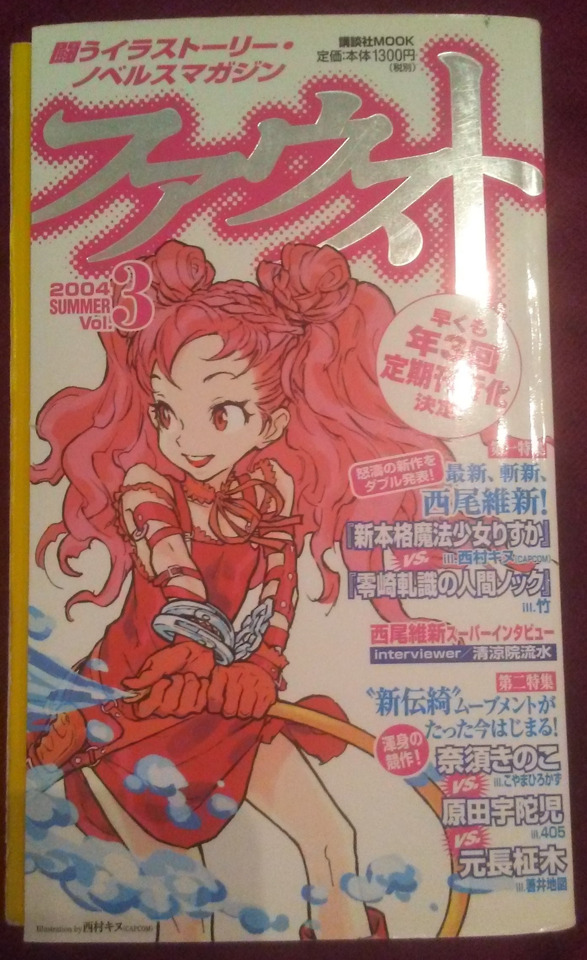

Got Faust vol.3 (2004), a Kodansha magazine containing some interesting Maijoverse things, as well as a whole lot of other content from all those Weird Japanese Mystery Novel authors (Ryusui Seiryoin, Nisio Isin, Kohei Kadono, Yuya Sato etc. etc), all reigned in by the chief editor Katsushi Ota.
There’s been several other volumes of the magazine, but this particular one has a lot of things I want to check out. While I say “magazine”, it’s really a 750-page-long mook that doesn’t look out of place on the bookshelf next to JDC or Maijo.
Things I’m looking forward to in this:
1) Maijo’s 4-page comic called simply Jirou (yes, Natsukawa!), which is really darn weird and I still can’t decipher what some of the handwritten text says. (I’ll post it later)
2) Maijo’s 30-page-long story Komatsuki Makiko, which also concerns Jirou, and drops an important piece of meta about a certain book Saburou wrote. It has suitably creepy Maijo illustrations. (This will have its own post too, eventually)
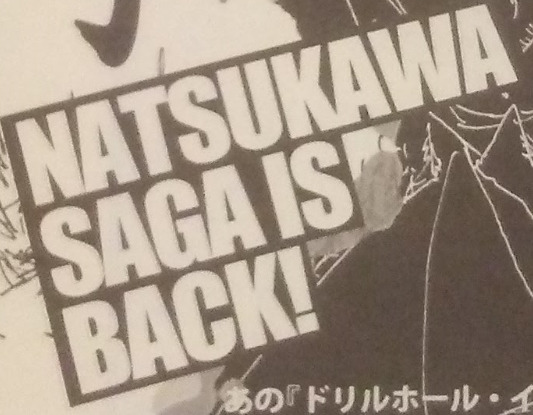
(HELL YEAH IT’S BACK)
3) a fragment of a literary criticism book from Hiroki Azuma, this particular piece concerning Tsukumojuku, meta-fiction, and “game-like realism” (seems some part of this is in earlier volumes of Faust?). I’m so happy to see people analyzing Tsukumojuku seriously ;w; Although I think I’ve seen some Maijo fans criticise some claims in this? We’ll see. I love that they put a spoiler warning in front.
Fun fact: this piece would later be included in Hiroki Azuma’s 2007 book The Birth of Game-Like Realism: Animalizing Postmodern 2, which is a sequel to his 2001 book Otaku: Japan’s Database Animal... which is the same book Neko Neko Nyan Nyan Nyan is shown reading in the Second Story. Sure is meta around here.
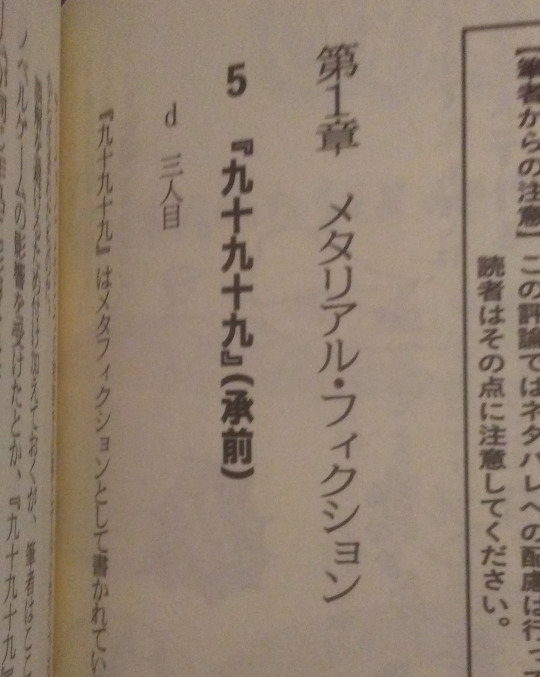
(BOY: ABSOLUTELY SPOTTED)
4) an episode of a story by Seiryoin that has nothing to do with JDC (at least I don’t think so?), but I’ll check it out regardless. BTW I like when they write the kanji in “Seiryoin Ryusui” like this:
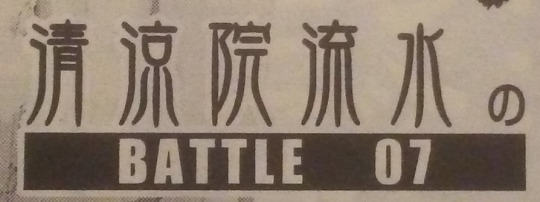
5) Nisio Isin getting interviewed by Seiryoin and Ota, which in itself is a fun premise. Spotted a fragment where they talk about giving characters weird names. Sounds wholesome, I’m in
6) Kohei Kadono (aka “that Purple Haze Feedback guy”) reviewing The Smiths album Meat is Murder. Er, sure?
7) and a whole damn lot of other short stories and articles
7 notes
·
View notes
Text
…..
TITLE
títlє :::
Anime-Top 3 Moments || DEATH NOTE || PART - 1 || Best L moments || Best light yagami moments ||
. . .
вєѕt díαlσguє(pαrt)
1
"This World Is Rotten, And Those Who Are Making It Rot Deserve To Die. Someone Has To Do It, So Why Not Me?"- Light Yagami
…..
TIME STAMPS
0:00 Intros
0:06 Light kills his first Victim
2:42 Light's Potato chip Scene
4:18 Light fights L
5:06 Ends
…..
DISCRIPTION
INTRODUCTION :::
Hi! we are CINEMA SIMPLIFIED. On our channel, We love to Watch, Review & Explain :
• Movies
• Web Series
• Shows
• Animations
• AnimeOther entertainment stuff...
.Other entertainment stuff...
Today, we are going to take a look on Death Note. Watch to watch such more videos and don’t forget to turn on your notifications!
…
Facebook:
https://youtube.com/channel/UCkEaHY1CBqRTKMd9Zi0fCxw
Twitter:
https://youtube.com/channel/UCkEaHY1CBqRTKMd9Zi0fCxw
Instagram:
https://instagram.com/cinema_simplified?utm_medium=copy_link
Pinterest:
https://pin.it/4SSobAg
Blog/Website:
https://sites.google.com/view/cinema-simplified/movies
Online Store:
https://sites.google.com/view/cinema-simplified/movies
…
____ __________
__________ _
CONTENT :
Death Note (stylized as DEATH NOTE) is a Japanese manga series written by Tsugumi Ohba and illustrated by Takeshi Obata. The story follows Light Yagami, a teen genius who discovers a mysterious notebook: the "Death Note", which belonged to the Shinigami Ryuk, and grants the user the supernatural ability to kill anyone whose name is written in its pages. The series centers around Light's subsequent attempts to use the Death Note to carry out a worldwide massacre of individuals whom he deems immoral and to create a crime-free society, using the alias of a god-like vigilante named "Kira", and the subsequent efforts of an elite Japanese police task force, led by enigmatic detective L, to apprehend him. Death Note ran in Shueisha's manga magazine Weekly Shōnen Jump from December 2003 to May 2006. Its 108 chapters were collected in 12 tankōbon volumes.
…
Genre
Mystery[1]
Psychological thriller[2][3]
Supernatural thriller[1][4]
Manga
Written by
Tsugumi Ohba
Illustrated by
Takeshi Obata
Published by
Shueisha
English publisher
AUS
Madman Entertainment
NA
Viz Media
Imprint
Jump Comics
Magazine
Weekly Shōnen Jump
Demographic
Shōnen
Original run
December 1, 2003 – May 15, 2006
Volumes
12 (List of volumes)
Novel
Death Note Another Note: The Los Angeles BB Murder Cases
Written by
Nisio Isin
Published by
Shueisha
English publisher
NA
Viz Media
Published
August 1, 2006
…
•Plots-summary :
Light Yagami is an extremely intelligent young man who resents the crime and corruption in the world. His life undergoes a drastic change in the year 2003, when he discovers a mysterious notebook, known as the "Death Note", lying on the ground. The Death Note's instructions claim that if a human's name is written within it, that person shall die. Light is initially skeptical of the notebook's authenticity, but after experimenting with it, Light realizes that the Death Note is real. After meeting with the previous owner of the Death Note, a Shinigami named Ryuk, Light seeks to become "the God of the New World" by passing his judgment on those he deems to be evil or who get in his way.
Soon, the number of inexplicable deaths of reported criminals catches the attention of the International Police Organization and a mysterious detective known only as "L." L quickly learns that the murderer, dubbed by the public as Kira, is located in Japan. L also concludes that Kira can kill people without laying a finger on them. Light realizes that L will be his greatest nemesis, and a game of psychological "cat and mouse" between the two begins.
…
•CREDITS-LINKS
Copyright Disclaimer under Section 107 of the copyright act 1976, allowance is made for fair use for purposes such as criticism, comment, news reporting, scholarship, and research. Fair use is a use permitted by copyright statute that might otherwise be infringing. Non-profit, educational or personal use tips the balance in favour of fair use.
...
This video features materials protected by the Fair Use guidelines of Section 107 of the Copyright Act. All rights reserved to the copyright owners.
Copyright @ [CinemasSimplified-2021]. Any illegal reproduction of this content will result in immediate legal action.
...
https://youtu.be/PfJ1PlM_kB4
https://youtu.be/T0iT9jv0cn8
https://youtu.be/jlckft0VfJk
•META-CONTENTS
#cinemasimplified ,#hollywoodmovies, #moviesexplainer, #webseries,explain #hometocinema,#anime,#animations,#animated,#shows,#tvshows,performances,#review,#Critics,#analysis,#explaining,#webseries,#comedy,#family,#action,#indian,#foreign
.
death note, death note theme, death note trailer, death note episode 1 english dub, death note music, death note opening 1, death note in hindi, death note anime, death note episode 1, death note theme song
____ __________ ____ __________
__________ _
__________ ____ __________
…..
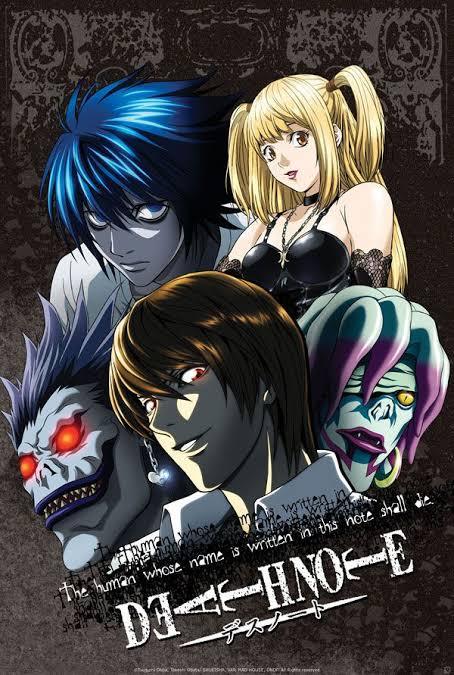
0 notes
Text
Jumble Sale: per Natale al Centro Sant'Eusanio il mercatino solidale e del riciclo
Jumble Sale: per Natale al Centro Sant'Eusanio il mercatino solidale e del riciclo ------------------- Venerdì 22 dicembre ore 18 presso la chiesa S. Eusanio la Messa cantata di Natale per l’autismo con il coro “Le Voci” diretto dal M. Alessandro Nisio.
Tra le numerose iniziative ed eventi proposti per le prossime festività, la cooperativa sociale onlus Loco Motiva presenta Jumble Sale, mercatino solidale e del riciclo nel cortile del Centro Sant’Eusanio in Porta d’Arce patrocinato dall’ASM di Rieti. Loco Motiva, in collaborazione con altre associazioni locali e la partecipazione fattiva dei volontari del Servizio Civile Nazionale, promuove la…
View On WordPress
0 notes
Text
Juuni Taisen 8 | Netjuu no Susume 7 | Mahoutsukai no Yome 7 | Houseki no Kuni 7 | Girls’ Last Tour 7
Juuni Taisen 8
I’m fresh off the Hozuki no Reitetsu season 1 boat and ready to rock! Let’s go.
Atari? Isn’t that some game company???
I can kinda feel Nisio Isin’s motivation waning, like Dragon and Snake don’t really matter. Dragon and Snake really don’t matter, considering they’ll die later anyways.
Well, at least Graphinica makes nice ice effects. They must be pretty coo-what, you want me to stop with the puns? I didn’t even finish that one.
I wonder if Ufotable hires Graphinica for 3D effects? Those fire effects look familiar.
Ooh…the Dragon brings the court to its knees. The more I watch, the more I’m convinced these Tatsumi twins are the Beppus. (I think I’ve said that for previous episodes, though.)
Hmm. I don’t appreciate the fact I just sat through two episodes’ worth of monologues, but hopefully we can actually get something good out of this. Like a battle.
Can Duodecuple please do something more useful in this show? As much as I like to hear Hiroki Yasumoto speak English, Duodecuple’s a lousy “god” to the zodiac and a horrible narrator, since the monologues do everything for him. Even Navi does better than this in the manga…
Netjuu no Susume 7
Sakurai has a pink keyboard. That suits his name (sakura = cherry blossom).
Interesting to note they don’t use the kanji for “I” (watashi) or “you” (kimi). There are two different yous and two different Is used to imply different genders.
Hayashi has signs saying moratta (received) which CR translates as “gift”. Hmm…there seems to be a disconnect between those two words.
Frigglin’ heck. It’s like these guys knew I was reading Haruhi Suzumiya light novels not too long ago!
Asymmetry short, ponytail long, mannish (?) short and ribbon hair (long). That’s what those hairstyles are.
As I pointed out once, this is from a web manga. Meta joke!
Netjuu no Susume eyecatches make good wallpapers once aga-what? Who’s this with the strange bow in their hair?
Giant burger plush. I want.
Koiwai uses Windows, LOL. (Vista, I think?)
The subbers spelt “server” wrong. It’s weird, because they spelt “sever” instead…
Moll-Oh. Morii. I get it now.
Koiwai has a sister? (based on switched genders)
Koiwai is gonna fricking pull these lovebirds together, isn’t he? He already did it in real life, so it’s not like he couldn’t here, that noob.
The butterfly effect in the background, haha. Harumi’s AFK, people. Respect the AFK people.
Oh…dear. They put Mamiko Noto on double cast duty, which makes sense, but they put Tomoaki Maeno as Harumi, which…uh, suits that muscular woman. Yuki though…they cast Yuki with someone else. I think, from the credit list, the brown character who’s paired off with Yuki is called “Hearth”.
Mahoutsukai no Yome 7
There are some interesting parallels between Alice/Renfred and Chise/Elias…
That mandrake is so rattled…I like it. It’s cute.
Serously, what do you call the sheep-thing?
When you get the chance to, pause and read the note. It’s not proper English, but that is some fancy handwriting…
Holy No Face, Batman! It’s a spirit that looks like the internet group Anonymous!
Is the church grim a fairy?
Chise is such an otome game heroine. I’d pay good money for an otome game with her as the protag.
Houseki no Kuni 7
Snow is a symbol of sadness…
Cinnabar doesn’t have blobs of mercury around themselves in the OP. Interesting.
Hibernation in Japanese is literally “sleeping [for] winter”. The language really can be simple sometimes.
They made these pretty dresses, all for sleeping huh? That Kongo must like being surrounded by gems then…haha.
I know gems don’t have any genders, but I like Antarcticite already. His extremely bishie look makes him a contender for my heart. I heard through the grapevine Antarcticite was a fan favourite too, so that’s…unfortunate. (Although En’s quite the fan favourite in Boueibu, so what gives?)
Antarcticite reminds me of Rod from Cinderella Phenomenon. I’ve been working on that otome game as of late, so of course I’d make the connection.
Let’s be real: does anyone find Phos endearing?
I think I saw an image of this on Yoichi Nishikawa’s Twitter. Dangit, Antarcticite spoilers.
Uh…question? Is this work shoujo or josei or what? I get shoujo vibes from it because it’s all long leggy stuff like CLAMP. Update: It’s seinen! Shocking, isn’t it?
Phos and her bowl, it almost makes Phos look drunk, haha.
“I do the things I can as best I can.” – Nice quote…uh, Antarcticite? Or Phos?
Is Phos gonna fall i-spoke too soon. Completely anticipated this show’s direction right there.
Why does a sheet work on Kongo too? Humour? It definitely worked on me, if that was the case.
Antarc is such a daddy’s bo-I mean, gem.
Whoa! That was freaky! Did they just imply-oh sorry. It’s a hard topic to speak about on the internet.
I wonder, could I write…actually no. I think I’ve done that already. (I was thinking of doing an article about how replacing oneself over and over with different parts could easily make you a different person, but I’ve done that kind of discussion already in Next to Me.)
Girls’ Last Tour 7
Those pipes are CGI. My CGI sense is tingling about it.
This show is a Problem when on Normal Mode. (What I mean by Normal Mode was that it was easier to see when they were in the temple a few episodes back – that’s the single exception.)
Yuu: a worse photobomber than Yumoto…
I’d like to make a joke about how the arrow points left and they just said “right”, but I’d need a visual cue, dangit. Too lazy for visual cues right now…
I thought Chi would be really grumpy as she slid down the chute/pipe/whatever, but she’s having fun too.
The button colours are around the wrong way. What the heck happened to make them like that???
Potato powder? Y’mean, potato starch???
This kneading montage is quite obviously looped.
Oh great. We got Shokugeki no Souma in Girls’ Last Tour, for some reason…
#simulcast commentary#juuni taisen#zodiac war#ancient magus bride#girls' last tour#land of the lustrous#houseki no kuni#mahoutsukai no yome#recovery of an mmo junkie#netjuu no susume#Chesarka watches Juuni Taisen#Chesarka watches Houseki no Kuni#Chesarka watches Netjuu no Susume#Chesarka watches Shoujo Shuumatsu Ryokou#shoujo shuumatsu ryokou#Chesarka watches MahoYome
0 notes
Text
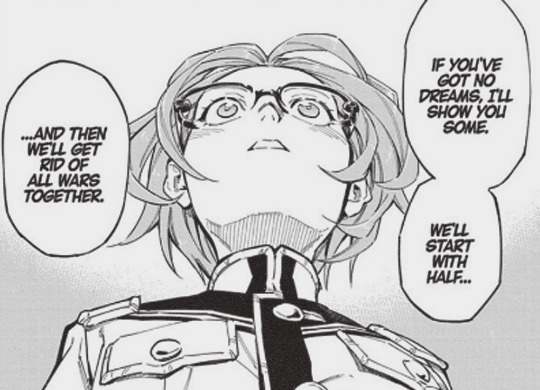
Cipher Academy, Chapter 2 Thoughts
I’m continuing out these chapter by chapter analysis of Cipher Academy Nisioisin’s newest Shonen Jump series, out of my undying love for him and his previous work Medaka Box (my favorite manga of all time). Let’s hope this series gets past chapter fourteen. The entirety of the first chapter spends time introducing the main character as more than just a token boy character among a huge cast of female characters, the second chapter in my opinion tells us even more about him as well as introducing his “flaw.”
1. You Won’t Be Bullied There

Iroha has a very “bullied kid” attitude in regards to their place at the school. He’s acapable of solving puzzles on his own, and working hard to study and yet because of low self esteem he immediately assigns himself the bottom rung of the class, assumes he’s inferior to the others, and just assumes he’s going to get picked on and bullied. All of these result in Iroha downplaying himself and presenting himself as a more passive, incapable person than he really is.
If you’re being bullied you’re the vcitim of something, right? If you’re a victim, you don’t have much of a choice. Iroha already showed in chapter one that they are capable of standing up for themselves in a pinch, and solving the puzzles that the person they’ve assigned the role of “class bully” Kogone set up for him when she got three girls to gang up on Iroha.

They want to give back the glasses, but they don’t, because they’re convinced not too. They think about joining a club, but then get scared off by Kogone. They’re a pretty passive actor getting pushed around from place to place without really thinking about what they wanted. Ie, if they did what they originally wanted to do they would have just handed the glasses back and then been on their way. He also tends to act like he’s just being pushed around and doesn’t have a choice in these matters. The glasses give him hints, but he’s the one solving the puzzles. Kogone is a pretty strong and forceful personality, but he’s perfectly capable of standing up to her when he’s called to.
Iroha’s homeowrk of asking everyone in the class what their dreams and ambitions are tell us an important fact about his character too, he’s really naive and doesn’t seem to udnerstand people. His partner tells Iroha right away that the girls are all laiars, and Iroha is completely surprised by this fact.
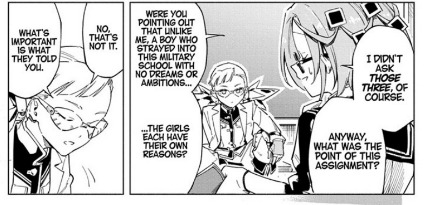
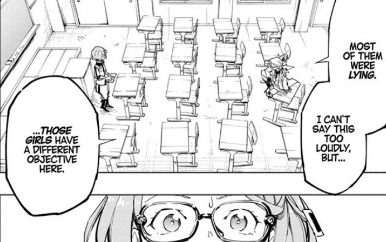
Which makes sense if you realize what a self conscious person Iroha is. They are constantly looking in, overanalyzing themselves, trying to scrutinize and look for flaws in themselves and because of that, they can’t pick up on something as simple as the other girls in class might be lying on him, and might not be what they seem to be. Which is also why he assigns someone like Kogone as the villain or bully role despite barely knowing her, because she puts on the act of being a dominating, pushy and authoritative person.
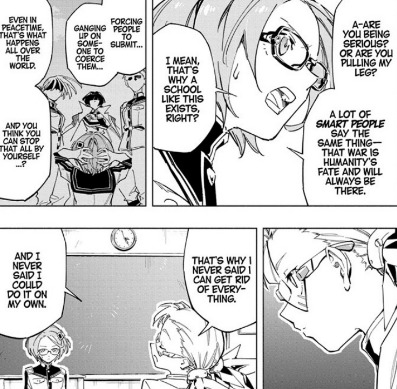
While pointing out that naivete his partner also challenges some pretty fixed beliefs, Iroha assumes he can’t do anything on this school on his own, because he is a bullied kid and this school is yet another environment where strong people gang up and pick up on the weak. His partner points out the flaw in that thinking right away by saying he’s not doing it on his own, he’s asking for help.
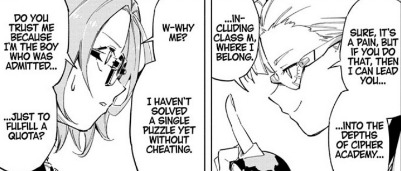
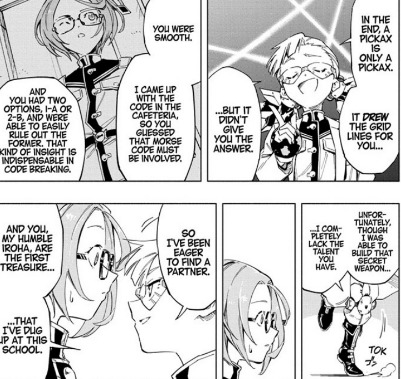
He also provides Iroha an outsiders perspective on hismelf, because he sees him in a different way. He sees Iroha as someone who’s hard working, practical and dedicated therefore a person suited to carrying out his more lofty ideals, to give a method to his madness. Iroha sees themselves as someone inferior, and his partner sees him as humble.
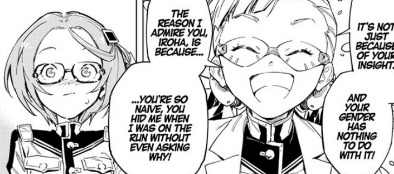
Naivete is estalbished this chapter as Iroha’s central character trait, for better or worse. They are innocent in a way that others are not which makes them straight forward, and earnest. At the same time they’re so naive they don’t see complexity in other people, which not only results in him not really understanding the people in his school but also in general getting pushed around because he can’t really see people’s dark sides or ill intents. His practicality and straightforward nature makes him more useful, while at the same time it makes him easy to use and take advantage of.
7 notes
·
View notes
Text
The Characters of Nisioisin (3)

Trickster - Kaiki Deishuu
Nisioisin often uses and reuses a lot of common character archetypes in his writing. An analysis on his common use of liars, thieves and cheats by comparing and contrasting the differences between Kumagawa, Iichan and Kaiki. More underneath the cut.
A. Defining the Trickster
Already covered in this post.
1. Introduced as a Villain
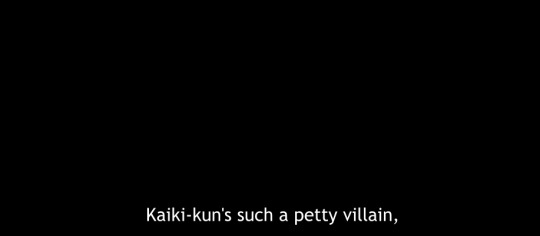
In the story proper Kaiki is introduced to us as the opposite of Araragi. If Araragi is the person who saved Senyjogahara’s heart, then Kaiki is the one who broke her heart. If Araragi is a hero who saves everyone, Kaiki is a callous villain who cons people and doesn’t seem to care about the consequences for those he cons.
Their interaction with every character they both interact with is the opposite. Araragi helps Senjyogahara, Kaiki stole her money and ruined her family home even though they are both positioned as people Senjyo once loved and thought of as a savior. Araragi saved Nadeko from the curse of the snake, whereas Kaiki is indirectly responsible for her being cursed due to selling curse charms to middle schoolers.
Araragi heroically faces off against Gaen to defend his sister, while Kaiki is the one who sold the information about Tsukihi’s location to Gaen in the first place for a quick buck. In every instance, Araragi saves, Kaiki cons.
Kaiki is also one of the few characters that Araragi shows an open disdain for. Araragi who is usually a very passive protagonist, and will go with the flow and talk casually with people who have beaten him half to death and is overly forgiving outright despises Kaiki on sight.
However, it’s important to remember that Kaiki calls himself a villain when making his first introduction to Araragi. He intentionally places himself as the villain so that Araragi can play the hero, even calling him “Manly”, “Cool” and “Grown-up” for doing so, implying again that Kaiki is his opposite. Kaiki however is a liar, and when he calls himself a villain intentionally that also is a lie.
2. Subverts Expectations

Everything we learn about Kaiki in his first introduction in Niseimonogatari is inverted later on. He is a character who exists to play upon other people’s expectations and cast everything into doubt. There’s even a meta aspect to this, originally Koimonogatari was foreshadowed to be Senjyogahara’s narration debut only for Kaiki to take the mantle of narrator from Araragi instead.
Ladies and gentleman, dear readers and all of you who picked up this book expecting Hitagi Senyjogahara to be the narrator have been duped. The lesson you should take home from this is every sentence ever written down by a book is bogus.
-Koimonogatari
Koimonogatari is a book that exists to flip everything set up by Nisei. It is a book where the villain saves the girl (Nadeko) whereas the hero is someone almost completely helpless the whole story (Araragi). You could even say that it’s Araragi’s actions which created the problem for Nadeko, as his complete ignorance of her, and his coddling of her helped push her to want to become a god.
Koimonogatari also starts a turning point in the series, where Araragi who had been a straightforward hero until this part starts to have his character deconstructed. Araragi who is constantly remarked upon as a hero who tries to save everyone, we find out that in Owarimonogatari is not only are there people he never even made an attempt to reach out to and help (Sodachi Oikura), but that Araragi is someone who uses obfuscation and self-deception to cover up his bad traits. He is someone who cares far more for the appearance of being good and helping others, then the actual work of helping others. This is again an idea that is set up in the intro to Koi.
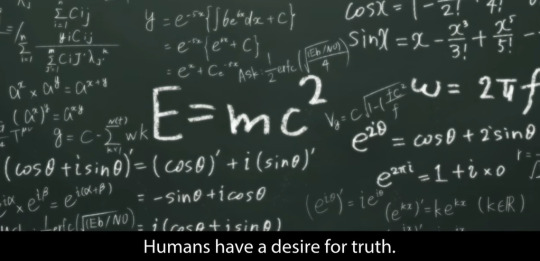

Humans have a desire for truth. or they have a desire to believe what they know is the truth. Kaiki brings up the example of the higgs boson particle that moves faster than light. Plenty of people will find this change in the truth alarming, even though most normal human beings aren’t physicists and won’t even bother to look at the math or data that proves the Higgs-Boson particle and will just read the headlines and take other physicists at their word.
People often care more for the image of something, than the actual thing. That’s true for Araragi as well who isn’t as noble as he appears to be and is for all intents and purposes a normal people. Kaiki is presenting us with the image of himself as a villain, because that is general is easier to accept then viewing himself as a more complicated person. Kaiki also, prefers to view himself as a villain rather than what he really is, which is a failure.
Araragi uses obfuscation to hide his bad traits, but as his foil, Kaiki always desires to hide his good traits. The reason being that Kaiki as a person when he acts with good intentions, things always tend to go opposite of the way he planned them. Kaiki feels in control when he lies, he can control others by lying to them, manipulating them, duping them, but reality is something entirely out of his control. He can try to save someone only to have the completely opposite effect.
“You tore apart the Senjyogahara - and backed her parents into a corner from which divorce was the only way out - because nothing else was going to work, right? You judged that the only daughter would have no future if you didn’t cut her mother off from the family.”
“Uh huh, that’s right. I was actually a standup guy. A real sweetheart, just looking out for a kid. I was only putting on a show of being nefarious. You’ve got all the details, don’t you? You’re really well informed. But don’t tell anyone, okay? It’s embarrassing.”
-Koimonogatari.
Kaiki is ultimately someone afraid to be good. That’s his weakness. He knows his good intentions are not guaranteed to produce good results, and he can’t face himself when his failures spiral out of his control so it’s easier to present himself as a villain. Kaiki, much like Iichan only feels comfortable when he’s deceiving everyone around him. He exists to subvert other people’s expectations because it’s a way of grabbing back control, in a world that Kaiki is mature enough to realize by now is completely out of his control.
3. A Lying Liar Who Lies
When Kaiki said every word written down in every book ever are lies, what he’s talking about is narrative. People who see the world in narrative view are applying a lens to reality to make it more palatable and easy to understand for them. Once again, they are preferring to hold onto images and preconceptions, the idea of the truth rather than the truth itself. It’s true that books are like reality, but people will often craft a narrative about reality in order to believe everything has direction, meaning, and a purpose when there is none.
Kaiki is also one of those people. He embraces crafting narratives, and telling lies because it gives him this idea of control he otherwise would not have. Kaiki is someone who doesn’t have a lot of control over his own life. If you take him for his word in the book he has almost no background, no family, he’s legally dead, and he’s a wandering vagabond that never remains in the same place for long. Kaiki’s way of reclaiming that stability and agency is to always craft a narrative around himself wherever he goes. He’s the one in control because he’s conning everyone else around him at all times. He acts like he always has all the cards in his hands, and he’s the smartest person in the room, because he can’t admit how afraid he is of not being that. Of being vulnerable.
Kaiki goes one step further not just by calling himself a liar, but believing the whole world is made up of lies. He’s not just a fake, everyone is. A world of fakes desperately struggling to be real.
“The second you say it out loud to someone, it deviates from your true feelings. All words are lies, it’s all a scam. No matter how true, the moment you utter it, it becomes embellished. Words are only representations, so impurities find their way in. If you want to make a wish, to make it exactly as it is, you absolutely mussn’t say it aloud.” - Koimonogatari
Yes, Kaiki I’m sure this speech has nothing to do with your fear of ever letting your intentions be known.
This is also something Iichan directly calls out in his own struggles with lies, the truth, and the trust in other people you have to find between them.
Hime-chan said everything was a lie.
I agree, that must be the truth.
But- really. Really, really, really you know.
If this world were like what Hime-chan said, if this world were like what I think.
We would not be suffering like this.
Do you get it?
If everything is a lie and there is not one ounce of truth - if ther is nothing of comparison, then everything ends up being the truth, too. - Zareogoto Vol. 3
Kaiki is able to call out Nadeko’s assertion that everyone in the world is a liar, everyone was misleading her and leading her on so easily because that is the same narrative lens he applies to the world to cope with it.
Let’s return to the Senyjogahara household again. Basically imagine you're Kaiki, a homeless man with no family who spends all of his time in luxury hotels and you're watching what looks like an ideal happy household. They are a rich loving family, with a good marriage, and their daughter is basically the school idol. What you Kaiki would call “Normal Law Abiding Citizens” the kind of life he could only dream of.
Traditionally held values say that these people should be happy forever, because they're good people doing the right thing. But the things the world tells us have meaning, are secure, have no meaning at all and easily fall apart.
So, he watches this good family, get struck by misfortune and fall apart. The loving mother sells her daughter to a cult basically, even though she originally joined the cult because of her daughter's sickness.
Now what's an easier story to swallow? That good people do bad things and good circumstances can easily turn bad for no good reason at all.
Or is it easier, and more meaningful to swallow that Kaiki showed up, conned them, caused the parents to get a divorce and therefore he's the villain in the scenario. By being the villain he turned the scenario into a story, he gave it meaning.
The first time I met Hitagi Senjogahara - two years ago, in other words - I thought to myself, What a fragile-seeming kid.
Of course, back then Senjyogahara was afflicted with her mysterious ailment, which is why her devout mother had summoned me, flying the flag of the ghost buster as I was. But even without the ailment business, I thought she seemed “fragile.”
The impression hadn’t changed.
Fragile.
[...]
Fragile, on the edge of fragmentation.
Which is exactly why her current self was a miracle. A mysterious ailment followed by a miraculous achievement - for someone who seemed so breakable to make it so far without ever breaking, not two year sago, not now, for eighteen years -
The mother broke.
But the daughter Didn’t. -Koimonogatari
So Kaiki says he thought Senjyo and her mother were fragile, but he probably thinks that about everybody. He's cynical and disaffected because he's seen this kind of thing happen again and again. That's why he tells lies, that's why he manipulates, it gives him the illusion of control over a world not only him, but no one else has any control at all.
There are two sides to the story of Kaiki’s perception of Senjyo. First, that people are more fragile than you think they are. Even if you come from a good household, have a loving husband, and have money you can break. The second is that people are less fragile than Kaiki thinks they are. Even if your mother turns against you, you lose your money, status, and family you still might not break. Both of these things are true at the same time, people are both more and less fragile. There are truth, and lies, and even Kaiki is unable to face reality directly because he prefers to stare into lies and shrowd himself in them then ever confront the truth.
4. Themes of Nihilism
Kaiki case believes everything is worthless and everything will be eventually lost so he thinks it's pointless to cling to things. However, that doesn’t have to be an inherently negative idea. Nihilism the rejection of the idea of inherent meaning, is also something that can lead to creating meaning which is where we get existential nihilism.
Nihilism is the precursor to existentialism. To find your meaning in life you have to first reject the meanings that other people give you.
With respect to the universe, existential nihilism posits that a single human or even the entire human species is insignificant, without purpose and unlikely to change in the totality of existence. The meaninglessness or meaning of life is largely explored in the philosophical school of existentialism.
He basically tells Nadeko that he likes money because the value of money is something entirely made up by people and yet it’s still something that has value.
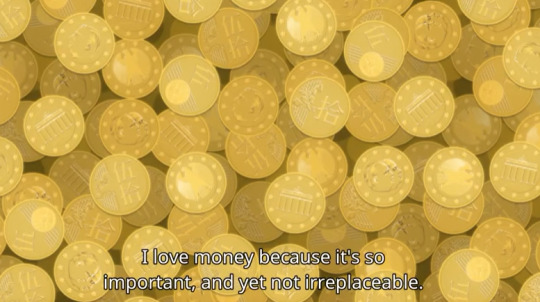
Kaiki loves replacable things while at the same time hating irreplacable ones, because he hates the way people tend to cling to things forever. Almost like, Kaiki himself is someone who always clings to his first love that he lost over ten years ago and doesn’t try to love anyone else, or find anyone else and Kaiki hates himself.
Existential nihilism also means rejecting what society tells you to think has value, because you have to reject first before you can come up with your own meaning. Which is literally exactly what he guides Nadeko to do, he tells her to reject the thing which she thinks gives her life meaning, her love of Araragi and then find a new meaning instead in being a mangaka. and that she can do this because everything is worthless therefore she can try anything.
He also suggests that the work of having to create her own meaning to life, and follow her own dream, will make her far more satisfied than simply following the job of a god which was given to her by someone else.
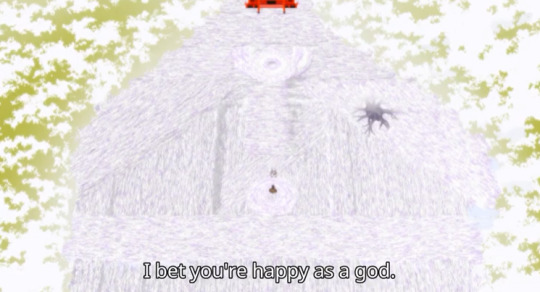
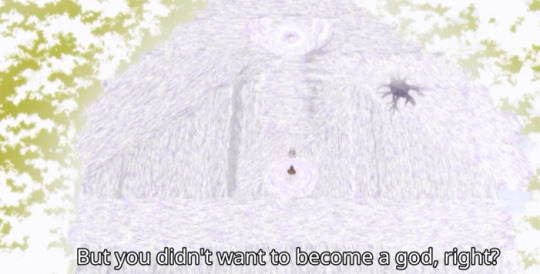
Humans are always changing their minds about what has value and that makes them human and Kaiki thinks that's a wonderful thing, that's existential nihilism, they're always inventing new meaning. Kumagawa is someone who always loses, but he tries again an infinite amount of times, and that struggle to keep trying again and again is what makes him human in Kaiki’s mind. It’s not the result, not the happiness or sadness, but rather in the constant searching for meaning that defines yourself. Once again. Kaiki sees the freedom in that. There is nothing in life that will make you truly happy, there is no meaning to life, but there’s freedom because it means you can try as many times as you want.
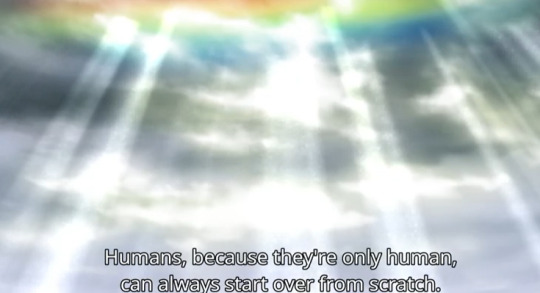
Everything is worthless. Everything will eventually lost. However, because of this it also means that you’re never going to lose something that will destroy you permanently. Because the things you were holding onto were worthless in the first place, you can always try to replace them. You can always try again and find something else. There is no ending that will permanently end you, there’s no loss you cannot suffer. Araragi is not really that important to Nadeko, she can live without him, she was only giving him that importance. This is also the compelte and exact opposite of Iichan’s a fatal would speech.
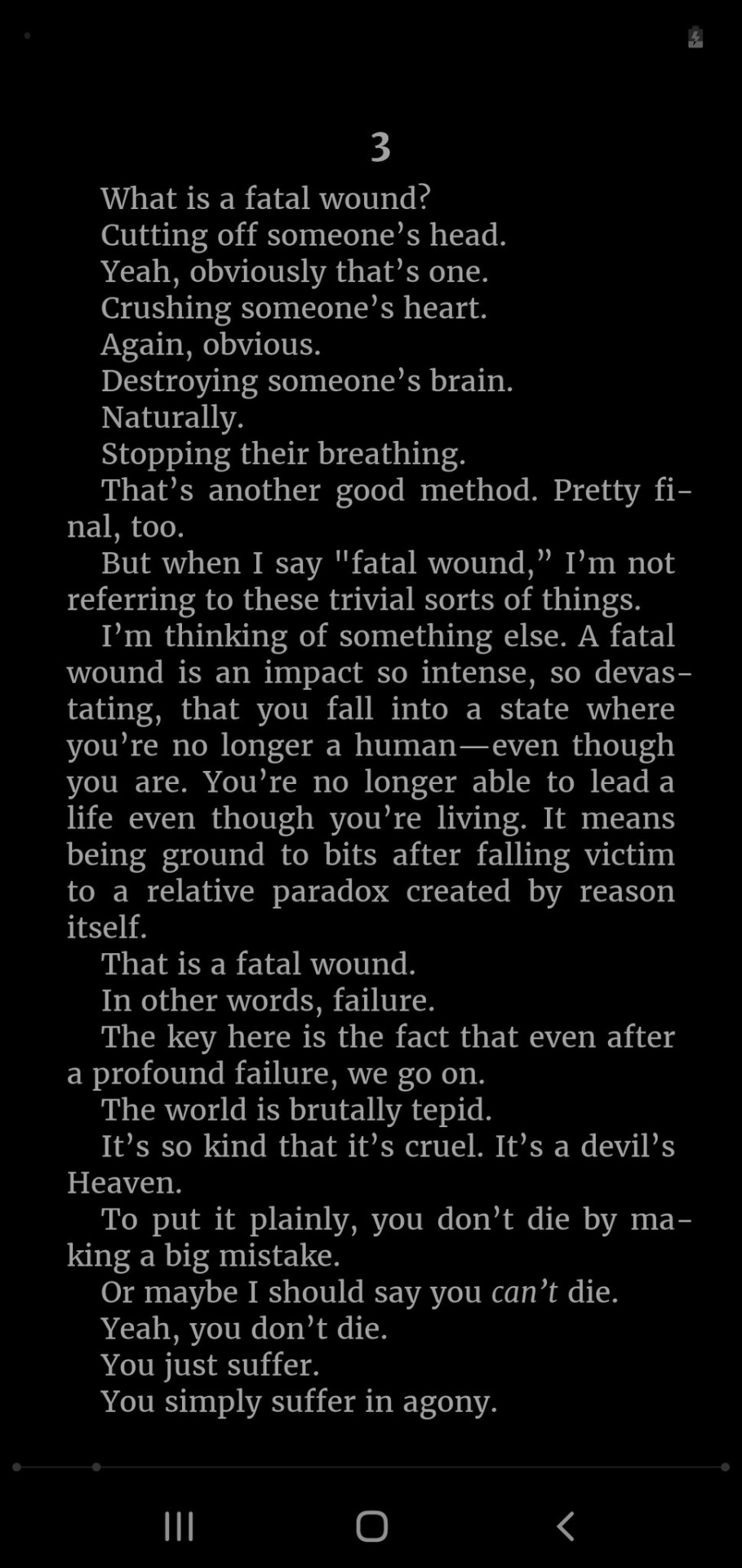
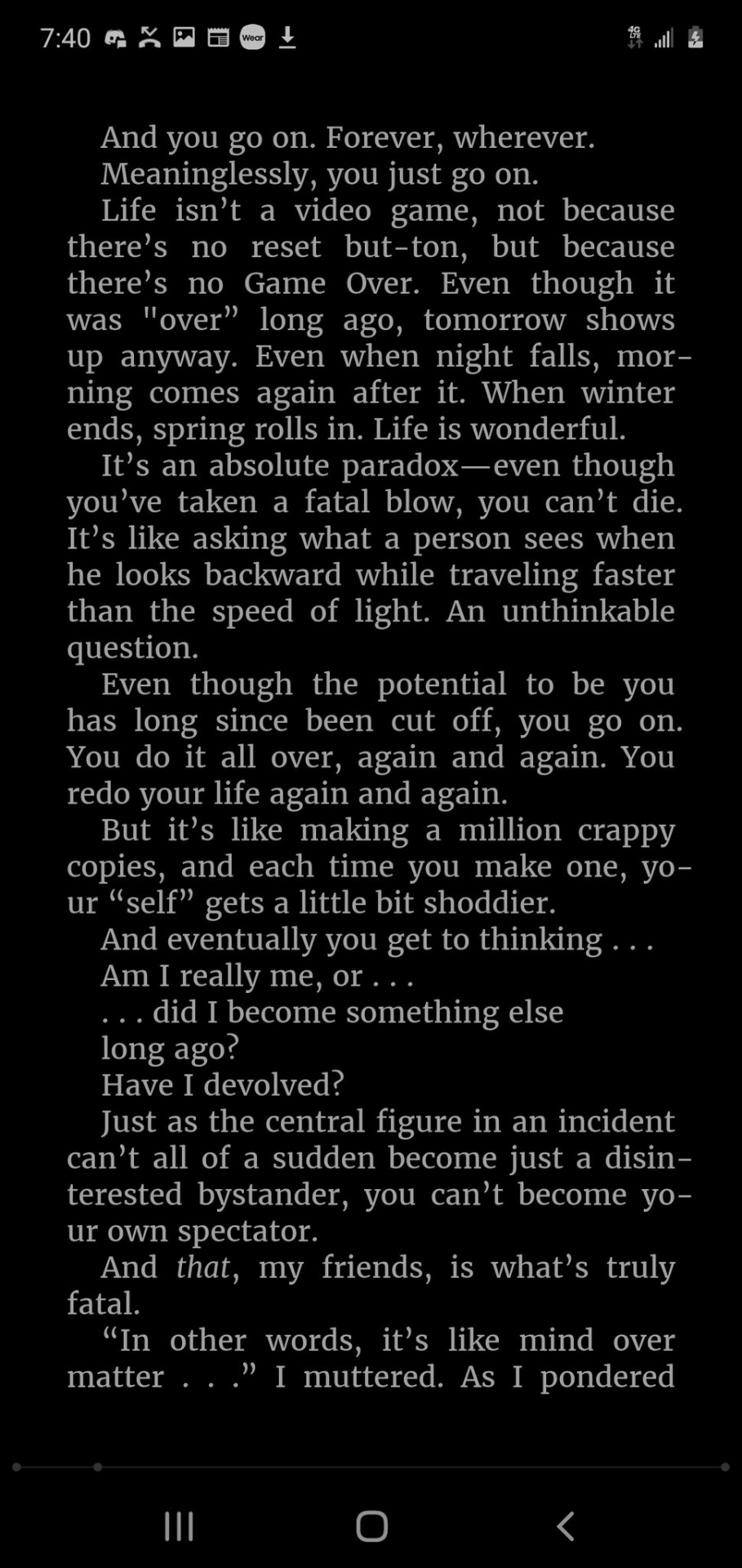
Iichan is someone so terribly afraid to hold onto anything, because he feels the process of trying over and over again at something he’ll never succeed at is going to completely destroy him.
And Kaiki would tell Iichan the same way that he tells Nadeko that him constantly stumbling over his own actions and trying to find meaning in them, is something in itself that has meaning. That's what makes him human, his search for meaning. But philosophically Iichan isn't there yet. He's still a little baby nihilist. Tiny. Infant. He hasn't grown up yet.
“A man devoid of hope and conscious of being so has ceased to belong to the future.”
“The struggle itself towards the heights is enough to fill a man's heart.
One must imagine Sisyphus happy
[Albert Camus]
So if you were to put iichan at one end as the baby nihilist, and Kaiki as the adult (kind of) nihilist then the adolescent Kumagawa would be right in the middle. That’s the way to compare the three, Kaiki is a mature adult who has figured out the way he wants to live his life, Kumagawa is someone constantly in flux like an adolescent, desperately struggling to reach the point where Kaiki is where he’s decided how he’s going to live and not quite there yet and therefore always doubting himself. Finally, Iichan is a child who wants to cling onto his immaturity and his completely wrong views of the world because he doesn’t want to face them or have to change. All three of them are liars, and but the lies they tell are different and that brings us to the end of this comparison.
75 notes
·
View notes
Text
The Characters of Nisioisin (2)
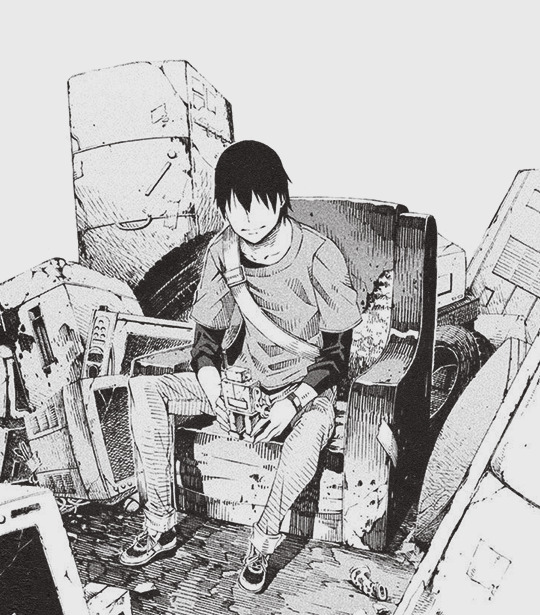
Trickster - Ii (Boku)
This is a post in an ongoing series about the common character archetpyes used by Nisioisin. If you want more information check out the previous post, here. Consider this a part two of that same post. Today we’ll be looking at the nonsense user, and deceiptful protagonist from the aptly titled series “Zaregoto” or in english “Nonsense”. More underneath the cut.
I established the four criteria we are going to be dividing this post into in the previous post, as well as introducing what the idea of the trickster archetype is. Using Kumagawa as the UR-example we’re going to compare Ii-chan with those same tropes.
Introduced as a Villain
Subverts Expectations
Lying, Liar who Lies
Inherent themes of Nihilism
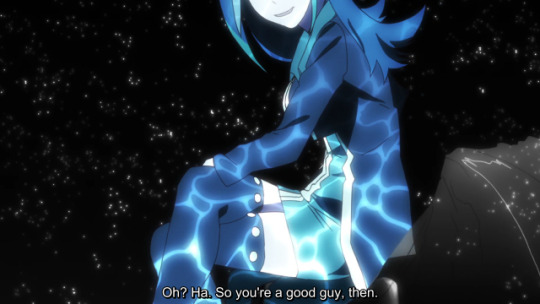
1. Introduced as a Villain
So, next Iichan. He's a special case out of these three because he's actually the series protagonist. But he still kind of fits the criteria because in his series the basic premise of every book is that iichan goes somewhere and a murder happens and then he tries to solve the murder for like the whole book and he sort of kind of solves it and then Jun Aikawa whose much more of a "hero" character than him, the coolest, sickest, strongest detective ever shows up out of nowhere and lectures him.
The sort of conflict set up between Ii-chan and Aikawa as two detectives of the story reminds me of a quote by Maiji Otaro, author of Jorge Joestar (among other things).
“Two detectives, one true. If both are detectives, then both must arrive at the same truth. But does that happen in the novels of this world?”
“Most novels with two detectives have one solve it and the other discover the real solution hidden behind it.”
“At that point, are they both still detectives?”
“Hmm.. they’re treated like detectives but certainly, within that novel, the latter is the real detective. But they might switch places in the next novel.”
(Jorge Joestar).
Ii-chan is never introduced as an antagonist from the start of the series he is and always is the narrator. However, he’s still introduced as something he is not. Kumagawa is introduced as a villain and goes on to become a deuteragonist. Iichan is a main character but he doesn’t affect the story like a main character ought to, nor does the story really revolve around him.
So there’s still an inherent lie to his introduction. He is introduced as the center of the story but he is not the story’s real center. However, there’s another subversion implicit in Iichan’s character from the first novel to the second novel.
The first novel is the one where Iichan plays the role of the detective the most straightforwardly. He figures out the trick, solves the case, corners the murderer, but doesn’t solve it all the way and gets lecture by Aikawa at the end. However, there’s a strange way that all the characters react to Iichan despite the fact that he constantly makes himself out to be just a completely harmless, and incapable normal guy.
“Ther’s no meaning. Just like there’s no meaning in your actions. You know, you’re, wow, so you’re the kind of guy who’ll get angry for the sake of a complete stranger. That’s not a very good thing. It’s not bad per se, but it’s not good. [...] That’s because people who can expose their emotions for the sake of someone else are the same people who blame things on others when something goes wrong. I despise people like you.
It had to be the first time in quite a while that someone had spoken that harshly right to my face. Slowly, she brought her glaring gaze to meet my eyes.
“You just let yourself get carried along by other people. You’re the type wo ignores traffic lights just because everyone else is doing it. You’re an abomidable excuse for a human being. They often say ‘Harmonize without agreeing’ but in your case, young man, it’s like you’re agreeing without harmonizing. I won’t say that’s bad. I won’t say anything as to that. One’s identity and worth are not always connnected. A train that runs along a track is better than a train that doesn’t. So I won’t say anything as to that. But I hate people like you. I despise them. People like you always blame things on others, never acknowledging their own responsibility.”
Ii-chan as a character who is introduced as harmless, and passive, never making any choices until we are shown explicitly in the second book that he is not. It’s with his choices in the second book that his true character is revealed.
2. Subverts Expectations
Though for Ii-chan it should really be “avoids any and all expectations.” The Zaregoto is a series that continually asks if the actions of its protagonist are meaningless or not. If any action that Iichan takes effects the outcome of the story in any way.
In Strangulation Romanticist, Ii-chan gets involved with a group of friends who all end up dead or in prison by the end of the story. The central question is what role did Iichan play. Here are some things Ii-chan does in the book, meet with a serial killer and then lie to cover up a police investigation and a private investigator tracking him down giving him time to kill more people, destroys police evidence of another investigation, taunts one girl who murdered another girl into killing herself to atone, knew another murder that was going to take place and did nothing, and then taunts a second girl who wanted to kill herself into killing herself who only survived because the police talked her off a ledge.
“Charges? What charges?”
“Falsifying information in regards to the Emoto case, encouraging Aoii’s suicide, not to mention concealment of evidence, plus withholding information and having that little rendezvous with Atemiya. Normally they’d have your ass for that, which I’m sure you’re well aware of, but I’ll take care of it for you. Althought, I suppose even if I didn’t Kunagisa probably would...”
(Zaregoto Volume 2)
Therefore, Iichan is someone who acts but doesn’t really face any real consequences for his actions, and that’s because he’s a master of avoidance.
In psychology, avoidance/avoidant coping or escape coping is a maladaptive coping mechanism characterized by the effort to avoid dealing with a stressor. Coping refers to behaviors that attempt to protect oneself from psychological damage.
Iichan is subverting a lot of expectations. He is the protagonist, but the story is not about him. He goes through all of these stories, but he doesn’t ever seem to grow or change from them. He’s a detective, but he never really solves the case or even cares that much about reaching the real truth. He’s written to be a subversion of everything the main character of a detective novel should be.
However, Iichan is also very aware of how a detective should act and deliberately playing with and subverting those tropes. Not only does he subvert the expectations of the reader, but also of the characters around him. He is avoidant, in that way it means he avoids any kind of contfrontation.
I didn’t hate losing. I hated compettition. I was thoroughly put off by the idea of vying for others over something. I hated fighting as well and thus never made friends.
This is a line that gets reused for Kumagawa as well.
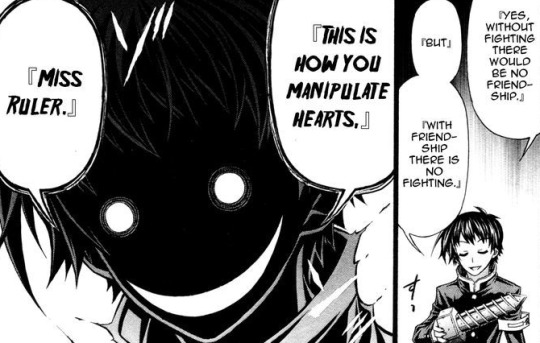
Which helps to illustrate the difference between them. Let’s say there is a problem, Kumagawa will charge head first at the problem and it will explode in his face, and Iichan will do everything in his capacity to never confront the problem or deal with it in any way possible.
Iichan is deliberately aware and sensitive to the expectations of the other people around him, and he feels like he will always be too inferior to fulfill them so he doesn’t even bother to try.
“I have been doing so.” I said. “But you know I have limits, too. It seems like everyone and anyone harbors some sort of expectations from me, and of course I would love to meet their expectations, too, but I cannot meet the expectations if I lack the capability. So to have someone say you failed my expectations is nothing but bothersome.”
Zaregoto Volume 4.
The way he avoids the expectations of others is rendering himself as ambiguous as possible, which is where we get to the next part.
3. Lying, Liar who Lies
Iichan is an unreliable narrator who never tells the truth in a straightforward manner, and even lies for half of the second volume. However, there’s more than that, there’s a deliberate trick to the lies he tells.
Iichan is someone who defines himself as ambiguously as possible. He acts like someone who others cannot possibly understand. Despite narrating from the first person, Iichan is only comfortable when he is not known by anyone. Iichan acts like someone who is barely present in his own story.
Answers have no real point.
They’re vague and ambiguos and unsound, and things that are fine that way. In fact, they’re better. Causing real change is a role that should be left up to the true “chosen ones” outstanding individuals like that scarlet Mankind’s Greatest, and the Blue Savant, it was never my responsibility.
It was no job for a common loser. For the comic sidekick.
Zaregoto volume 2.
Once again we see the contrast between Kumagawa and Iichan, if Kumagawa is a character who shows how strong and capable one loser can be, then Iichan often waxes poetically in his narrative about how weak and incapable he is. If Kumagawa is a good loser, than Iichan is a sore one.
Iichan defines himself as ambiguous on purpose to avoid responsibility for his actions. In less fancy words, if nobody can understand Iichan than nobody can call him on his shit. That’s his goal, essentially. He doesn’t want to work hard to change, or be confronted about any of his actions, because for him merely the act of living takes all of his effort to tread water without making any progress.
Avoidance is a trauma response, Iichan spends all of his time distancing himself from his own actions rather than confronting any of it. However, Iichan is more complicated than that because Iichan’s ambiguity has another side effect making him out to be something that he is not.
“Just by being there, you startle others, just by being there, you make people lose their grip on themselves.. ther’re a bunch of people like that. You can’t relax when you’re with them, it annoys you, things don’t go as planned, people like that, you know, they’re even scientifically explainable. In other words the missing part. Because the missing part for the observer ends up looking the same, it feels like the person is having their ineptitude pointed out at them, and it startles them [...] You’re just like everyone, and that picks at people’s subonscious, that’s why you’re aimless. And yet you still manage to come out on top. [...]”
Zaregoto Volume 3
All of these things Jun points out in this scene are Jungian ideas of the trickster. Iichan is an inferior person who seems to exist to point out the inferiorities in other people, and use it to play tricks on them. While viewing him as this role of the trickster, Aikawa is not really treating him like a person. (Aikawa’s very dramatic).
Which is where Iichan finally gets his trick. It’s a trick in two parts. He constantly underplays his own agency, while at the same time overplaying his suffering.
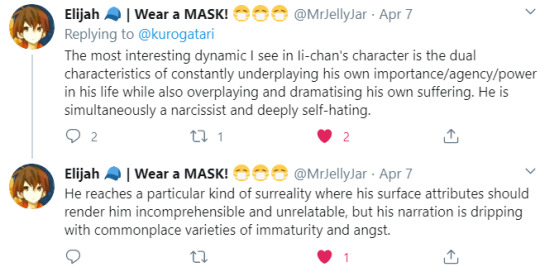
In other words, while insisting that he is the least improtant person on earth, Iichan at the same time hems and haws like the main character of a tragedy. IIichan wants people to empathize with his suffering, and he wants to be important, but he doesn’t want any of the responsibility of being important. He doesn’t want to take any degree of control of himself or others, so he tries to balance himself between these two conflicting ideas.
1) He is not a protagonist, and therefore the events in the story have nothing to do with him.
2) He is the main character of a tragedy. The world is centered around him, he is someone special and important, and that makes him suffer, but he takes no agency in the role.
Doing this he gets the best of both worlds. He gets to always be involved and important to others, while at the same time uninvolved and is never held accountable for his actions. He’s never challenged or forced to grow or change in any way.
These are the two lies that Iichan tells, and those lies form a narrative. Iichan is lying to give a narrative to his own trauma, and therefore try to extract some kind of meaning from it.
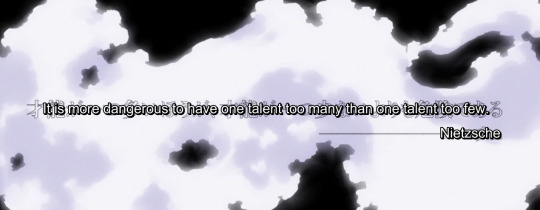
4. Inherent Themes of Nihilism
We once again return to the sacred image.
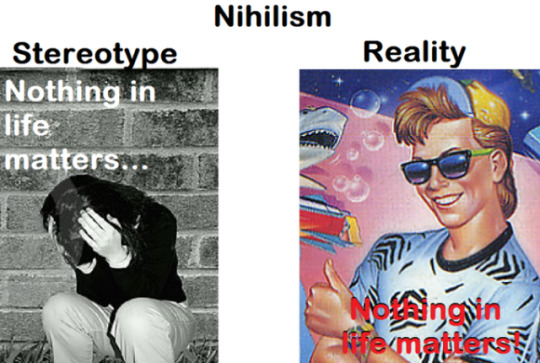
Iichan is a moral nihilist. He’s on the elft side of that image.
Moral nihilism (also known as ethical nihilism) is the meta-ethical view that nothing is morally right or wrong. It is built on three principles.
1. There are no moral features in this world; nothing is right or wrong.
2. Therefore, no moral judgments are true; however,
3. Our sincere moral judgments try, but always fail, to describe the moral features of things.
Iichan’s view is basically that of, if there is no meaning to this world then any attempt to define meaning is pointless. He (let’s say it again class) usually uses this as an attempt to evade any and all responsibility for his actions.
Iichan doesn't want other people to look at him, he doesn't want to be at fault when things go wrong, but he also wants to be important. So he's continually on a tight rope walk with those two very conflicting desires.
So basically Iichan sees no value in his own actions. He sees no value in the world. He doesn't really have any set of morals, except that he thinks murder is bad. Except sometimes he doesn't really care if certain people are murderers. Zerozaki is a murderer and Iichan hates him but doesn’t actually make any sincere attempts to stop him. Kunagisa commits murder in volume 4/5 and Iichan goes out of his way to cover it up. He apparently doesn’t consider goading a girl into suicide to be a form of murder. But at the same time he's so desperately searching for meaning, because he wants to feel fulfilled.
Iichan thinks that talent and genius are perhaps one thing that could give the world meaning. His best friend is a super genius, and he kind of clings to her and is jealous of her because she's someone special. See he thinks there are people whose lives have meaning despite being a pretty blanket nihilist, but because he's not talented he's not one of those people. Talent is something that could possibly give life meaning but being outside of the talented people it makes no difference to him he can only gaze at it from afar
Iichan is someone who is constantly downplaying his own meaning, while at the same time trying to find some meaning vicariously through others, like Aikawa and Kunagisa who he considers to be the real heroes of the world. Despite Iichan insisting there’s no meaning, he also has an attraction to narrative view of the world. Which is something that you know... has meaning, because stories are written with intent and purpose by an author.
In the sixth volume there’s a concept called “The Story” which one character belives that everything is pre-destined, like it’s all some pre-written story. Therefore while you can make small changes in your own actions it never effects the big picture in any way.
This is once again a very convenient idea for Iichan, who avoids responsibility to believe in. He’s very attracted by this idea because it takes control out of his hands and means his own actions aren’t really his fault.
To be honest, this must be one of the most boring conversations to be listening in on. It had gone so far into the conceptual, that even for myself, participating in the conversation, the words of the man with the fox mask seemed as hazy and illusory as a dream. You could say I do not understand what he is saying.
However, then why.
Then why does what this person says strike so deep?
Why does it resonate?
[...]
Then, no.
I do not want any part of such importance.
I do not want anything to do with the core of the story.
Here we go with Iichan’s double negative, he denies having any role or agency in the story and yet at the same time believes that such a thing as the story exists because it means to some extent his actions are out of his control because he can’t accept that they are.
Is Iichan’s role in the story ultimately meaningless? No. There are always clear and distinct consequences for his actions. In the same volume (6 - cannibal magical) where the concept of the story are first introduced that everything is predetermined and you can’t change the big picture, the events of the story disprove that assertion.
Iichan is given like, a million warnings not to go to a lab. Aikawa tells him not to go to a lab because she has a bad feeling about it. The literal assassin sent to that lab talks to Iichan and says “Yeah, I was sent here to kill people.” Another person who was in the same situation just walks away from the problem. Iichan sees the assassin going out to kill people in the middle of the night and just chooses to... go to sleep.
Then he wakes up to everyone dead in the morning. The point being Iichan had a million chances to avoid this situation, takes absolutely none of them, and then acts like this was a completely unavoidable fate. He hems and haws about having no choices, but he’s clearly given choices, he just doesn’t take them, or makes exclusively bad ones.
Iichan wants to avoid consequences by not choosing, however the choice to not choose is still a choice in itself. Everything is a choice. Even avoidance is a choice. Which is why Iichan’s actions do actually have meaning, just not in the way he wants them to. He’s not a special person, and he’s not anyone extraordinary, but he is someone who has to face the consequences of his actions no matter how many narrative tricks he pulls to avoid them.
The actual trick of Iichan’s story is that he really is the protagonist, he just doesn’t want to be.
66 notes
·
View notes
Text
The Characters of Nisiosin (1)

Trickster - Kumagawa
Nisioisin is a prolific writer famous for the many distinct characters he creates, and writes with a unique sort of empathy that lets them be their weird and crazy selves without judgement. Okay, with plenty of judgment. This is the start of a new series I’ve been working on which analyzes some of the common themes that appears in Nisioisin’s works with more depth, as Nisioisin is the type who reuses, and recontextualizes old ideas a lot.
The first thing we’re going to be taking a look at is Nisioisin’s take on the Trickster type character with Kumagawa. I’ll be doing Deishuu Kaiki, and Ii (Boku) to follow up.
A. Defining the Trickster.
Before we determine what a Trickster is we have to define what an Archetype is when it comes to character writing.
In theory, Jungian archetypes refer to unclear underlying forms or the archetypes-as-such from which emerge images and motifs such as the mother, the child, the trickster, and the flood among others. History, culture and personal context shape these manifest representations thereby giving them their specific content. These images and motifs are more precisely called archetypal images.
In other words they are ideas and images that reoccur in stories all around the world. For example a character like Loki has several things in common with the christian idea of satan even though they come from two different mythologies, both subvert the ‘father-figure’ king of their respective heavens, and both are responsible for kickstarting the chain of events that lead to the apocalypse scenario in both religions.
Archetypes are characters that follow certain pre-determined patterns we all recognize. Luke Skywalker is what most people would recognize as the hero of the story, Obi-Wan Kenobi is the mentor, just by thinking of ‘hero’ and ‘mentor’ you already have a pre-conceived idea of how the character is going to act in the story. This is a good guideline for analyzing the similiarities between the characters Nisioisin uses in his works.
The Trickster, Jung says, is an aspect of the shadow archetype, at least in its negative traits (see "On the Psychology of the Trickster-Figure". Examples of the trickster are Satan, Loki, etc.)
The shadow is an archetype that consists of the sex and life instincts. The shadow exists as part of the unconscious mind and is composed of repressed ideas, weaknesses, desires, instincts, and shortcomings.
If the Hero is what everyone thinks a good guy is, then the Shadow is playfully the opposite of they. They are what everyone thinks a good guy isn’t. They represent the repressed aspect of our minds, and exist to call into question the common order.
The trickster, obviously, deceives, often playfully, sometimes painfully. The Fool is a shadow figure distressed by some unconscious lack of power, often driven by greed or an inordinate desire for fame (all archetypes), who projects his or her inadequacies against scapegoats as described above. The Fool is not always negative, of course. A relatively benevolent form of the fool is the Clown, who is more aware of his or her trickster aspect, perhaps, than is the fool. [Source.]
The trickster is what the hero is not. They are the shadow the hero casts. While the hero’s domain is the light, the trickster often works in the dark, behind the scenes sneaking around in the shadows. The hero is often straightforward, the shadow deceives and obfuscates. The hero is conventional and the trickster unconventional.
In mythology, and in the study of folklore and religion, a trickster is a character in a story (god, goddess, spirit, human, or anthropomorphisation), which exhibits a great degree of intellect or secret knowledge, and uses it to play tricks or otherwise disobey normal rules and conventional behaviour. he trickster crosses and often breaks both physical and societal rules. Tricksters "...violate principles of social and natural order, playfully disrupting normal life and then re-establishing it on a new basis."
[SOURCE.]
To simplify there are four rules I am going to set as reoccuring in Nisioisin’s use of the Trickster Archetype:
Introduced as a Villain
Subverts Expectations
Lying, Liar who Lies
Inherent themes of Nihilism
1. Introduced as a Villain
Appearances can be deceiving. It is the trickster’s goal to deceive your expectations, and in that they subvert the natural order. In most stories the hero is good and the villain is bad. Straightforward so far, yes? Nothing is straightforward when a trickster is involved. Kumagawa Misogi is someone who is introduced and built up as the ultimate enemy of Kurokami Medaka. A girl with a noble goal of trying to make everyone happy. Therefore anyone who opposes her would have to be ignoble, right?
Kurokami Medaka brings out the best in people, and Kumagawa Misogi brings out the worst. That is the simple, black and white comparison that we’re given between the two of them at the start of the manga.
Kumagawa is so inhuman when we first meet him that for the first 52 chapters of the manga, when other characters refer to him and as he’s built up as an antagonist his face is always obscured. He’s not even seen as human in the eyes of others.
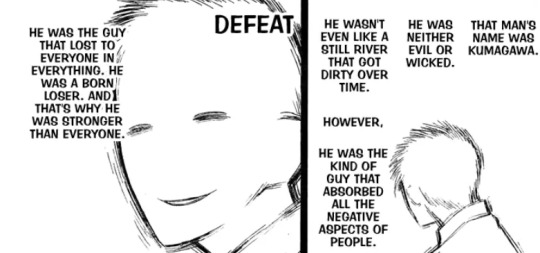
However, this simple idea is subverted by the manga itself. Medaka and Kumagawa are compared not as opposites but rather as complemtnary forces who not only have several things in common with one another, but also play into each other.

Kumagawa is someone who can uniquely understand Medaka’s point of view in a way other people cannot. He’s not someone who opposes Medaka, but rather someone set up to oppose her. Kumagawa is not only aware to some extent that Medaka is the hero of the story, but he’s chosen to make himself the villain.
2. Subverts Expectations
The entire point of Kumagawa’s arc is that even the absolute scariest types of people the minus, aren’t true villains of the story, even when they don’t want to be sympathized with, even when they don’t want to be saved, they are deep downs still people.

Kumagawa’s arc intentionally sets up the idea that some characters are natural villains who don’t want to be saved, only to subvert that idea in the end. Tricksters are subversive, they exist to flip standard notions of good and evil, black and white ideas on their head. They are transversive, once they have played their role in the story it is impossible to think of things the same way again.
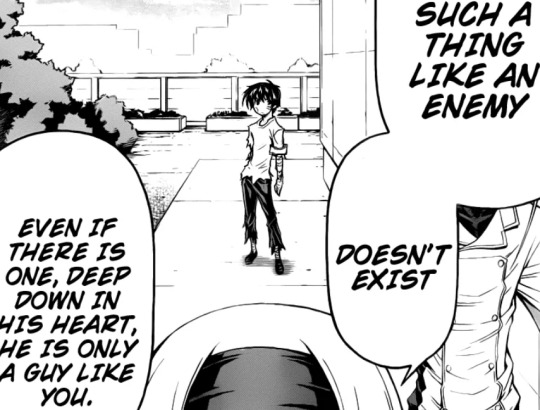
Kumagawa is a character who exists to subvert what we call traditionally binary opposites. That is ideas that we think oppose each other. Winners and losers, strength and weakness, talented and untalented, all of these ideas tie strongly into Kumagawa’s character.

Ajimu brings up Kumagawa’s bitterness towards the status quo. The people who are happy are the ones who are currently in power. They are the ones who are able to work hard, they are the ones who are able to have friends, they are the ones who always win in the end.
Kumagawa’s original goal is to flip those ideas on their head. To show that even people who are outside the power structure, outsiders like him, are able to have friends, to work hard, and to win.

By doing this he subverts the natural order and turns it around. This is what comes to a head in his fight with Medaka. Usually it would be the winner is the strongest, but the idea is flipped in that fight it’s proven the one who loses more and climbs their way back up is the strongest one.
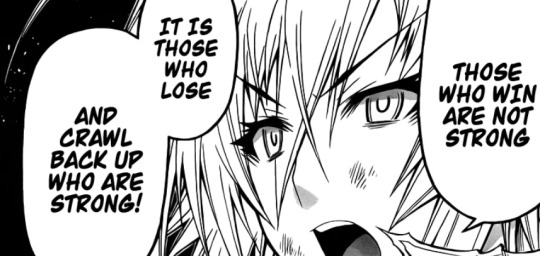
There is strength in weakness and weakness in strength and these ideas never play in the straightforward ways we think they will. That’s why Kumagawa who identifies as weaker than anyone else, is able to easily subvert the balance of power tip it in his favor and overcome strong people.
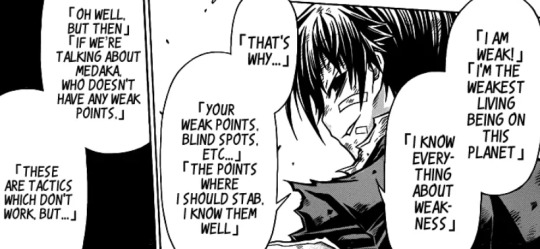
3. Lying, Liar who Lies
Basically Kumagawa lies as compulsively.. He says everything in [brackets like this] and it's like always speaking and using airquotes after everything you say. It makes everything he says sound completely insincere. It’s also a pun for ‘To Show Off’ meaning he exaggerates everything he says in order to look cool.
Kumagawa will just blantantly lie at times for no reason other than to lie. One of his habits is to claim things aren't his fault when they obviously are. His introduction is screwing everyone to a wall, and then standing there covered in their blood go [I'm not the one who did this, it's not my fault.] His introduction is him rattling off lies mainly to confuse people and make himself impossible to read.

The key word is once again these expectations. The trickster uses lies as a mean of controlling the expectations of others, playing around with them and he gains some measure of power over this. A trickster is often not very traditionally powerful and has to rely on his wits to get by.
Kumagawa's life is pure chaos and basically everything ever will go wrong for him, so he tells lies to have some kind of illusion of control over that chaos. People who see life as a story do so to give themselves agency, to trick themsleves into believing they’re the ones telling that story.

Kumagawa pretending that the world is a manga, gives him the illusion that he can read, and anticipate the world like he would a weekly shonen jump manga. When in reality the world is what it’s always been, complete chaos. Kumagawa tells himself that lie to obfuscate himself because he finds safety in those lies, in no one knowing who he truly is.
He finds his identity in those lies, which is why he intentionally plays the role of the villain when he could be a hero. Kumagawa will lie about his identity, first to be a bad victim, to be an ugly victim, he pretends these things have value because it's all he has. He only has negative experience of the world and the trauma he’s asquired so far and that’s what he finds familiarity in. Kumagawa finds identity in being the world's biggest loser.
4. Themes of Nihilism

Kumagawa is a character who directly confronts Medaka’s assertion that she was ‘born for a reason’, by asserting the opposite. That there’s no goal in life, no point to being alive, and therefore humans are born for no reason.
While that seems like a wholly negative statement at first, the point of Nihilism is to question established ideas and power structures. It’s to dismantle what we are told matters, and what we are told has meaning and instead come to understand our own meaning.
If Medaka is an existence desperately trying to give meaning to life, then Kumagawa is trying to reject the assertion that life has meaning. It’s understandable why. The values that are said to hold true for everybody else have never once held true for Kumagawa. If you work hard you’ll win. Bad people are the only ones that suffer. If you ask for help you’ll get saved. Kumagawa has witnessed all those things he is told should be true about the world proven as falsehoods, and because of that his response is one of rebellion against the order.
Nihilism is a step on the way to existentialism.
In the most basic terms possible it's like. Rejection of societal meanings and values that you are told about -> Rejecting everything which leads to moral nihilism (nothing has meaning boo hoo) -> Realization that if everything is just made up value you can make up your own, and that you're not freed from society's obligations and can pursue what you want (sunglasses nihilism, party time).
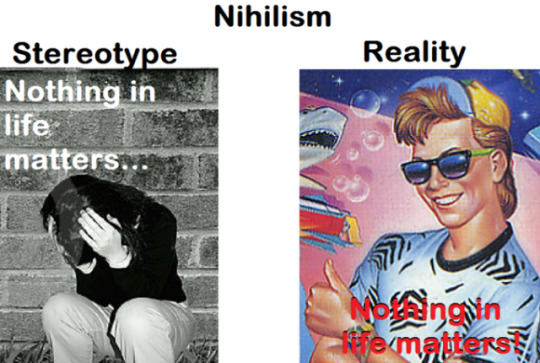
Kumagawa as a character is firmly in the middle step. He’s a character who rejects everything, because he finds his identity in his rebellion against traditionally held notions.
Kumagawa is a character trying to reject what everyone else tells him is meaningful, and instead trying to create his own meaning. He’s trying to find the positives in a life that’s literally nothing but suffering. That’s the point of his whole complex about minuses, that people who have everything go wrong for them still have a reason to smile.
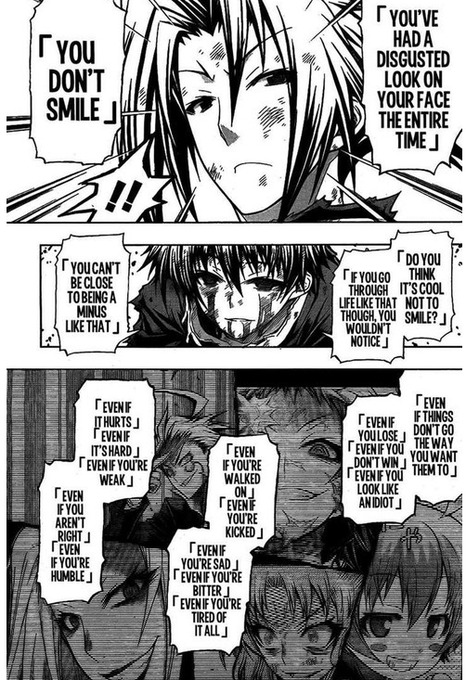
Basically Kumagawa's philosophy becomes, if I can endure all of this and still keep on laughing and smiling, then you can too. Even living the worst life possible where you can't accmplish a single thing, and can't amount to anything, you can still find something to laugh and smile about.
It’s a philosophy unique to him, and one that he could only come to by challenging the established norm. Not only does Kumagawa’s nihilism help the minuses, but he also ends up helping Medaka herself as she’s the one who has to let go of the ‘reason that she was born’.


Just like Kumagawa, Medaka has to go and seek out her own reason. As in the end the two of them as a pair, hero and villain, are not opposites but rather two sides of the same coin. They are complentary forces that contain parts of each other.
They are both ultimately, whether trickster or hero, very human characters. The roles in the story they play only serve to flesh out their humanity. Which is another theme in Nisioisin’s writing, but we’ll continue that in the next posts.
#kumagawa misogi#medaka box#medaka box meta#nisio meta#nisioisin#mb meta#kurokami medaka#trickster#jungian archetypes#jung
58 notes
·
View notes
Note
Pls... your top ten nisioisin characters... i love your lists...
I LOVE TO TALK ABOUT HOW MUCH I LOVE MY FAVES. IF YOU EVER ASK WANT TO ASK ME WHO MY FAVES ARE FOR A SERIES FEEL FREE TO SEND ME AN ASK.
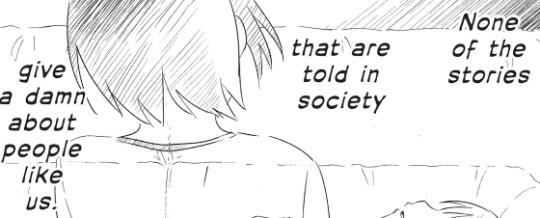

My favorite thing about Niosisin’s characters is how genuinely subversive they are. Not in the sense that he’s deconstructing tropes, but rather these are characters who would never get their story told in most other books, because they are not good, or righteous. Nisioisin breathes life into them, and allows those who cannot be forgiven, those who are deviant, those who have dropped out of society to still remain human. He tells their stories the same as everybody else, because their lives are just as fun.
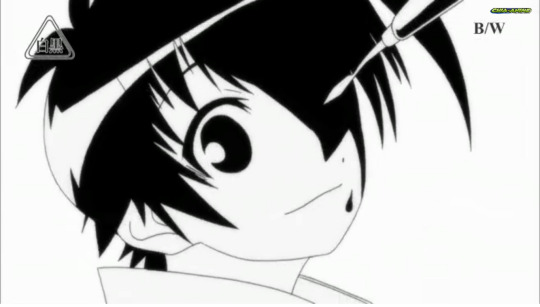
1. Even if I’m hated, Even if I’m Despised - Kumagawa Misogi
He’s only my favorite character of all time so I’ve talked about him on this blog before, but let me find something new to say. Oh Kumagawa, how do I love thee, let me count the ways. Or maybe it’s Oh Kumagawa, how do I despise thee let me count the ways.
Kumagawa’s character is so interesting because it’s written in antithesis of everything a shonen protagonist is. For Kumagawa, his determination just makes him fail worse and worse. His desire to be involved and help people always guarantees the worst result for the people he wants to call his friends. His empathy is extremely painful for him, and is a trait that drives him insane rather than making him a kind and loving person.
A lot of time in manga empathy is like, a magic fix-it-all bandaid that basically makes the main character a saint by being able to emotionally relate to anybody. Kumagawa is the reality of that situation. He is empathic, and by relating so much to the humans around him he shows how ugly, and messy human emotions can really be. Recovery and saving others isn’t necessarily a beautiful thing, it’s complicated and sloppy.
Kumagawa is a character where getting stronger won’t solve any of his problems. Which is what happens in a lot of shonen manga, rather than trying to emotionally mature the main character will just learn a new fighting technique and develop that way. Instead, Kumagawa winning fights means absolutely nothing. The only thing that can free him is to grow up as a person, and the fact that Kumagawa’s arc is given equal weight to both of the main characters shows how accepting of weirdoes and broken off beat characters Nisioisin is as an author.
What I like about him is how genuinely broken he is, but not for monstrous reasons but for entirely human ones. It’s his genuine care for others that breaks him the most. He’s a character written to be insane, but also geniunely human. Kumagawa is not able to live properly, or even act like the main character like Zenkichi and Medaka are but he’s still able to find his own way to live.
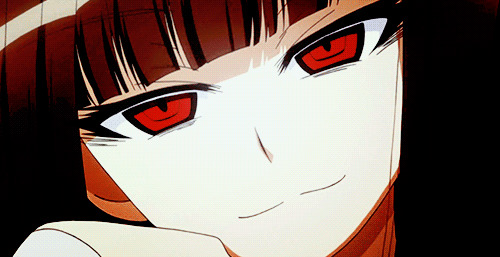
2. I don’t feel any reality from you people - Ajimu Najimi
“Genius who is super good at everything, but is secretly sad and lonely on the inside” is a pretty common Nisioisin trope. It tends to be pretty hit and miss with me, but it also resulted in one of my favorite characters of all time. I tend to like these types of characters more when they’re allowed to be… what’s the word… unlikable. When the story isn’t trying to go on about how cool they are.
The reason why I love Ajimu is because she is just like Kumagawa, a subversion of the character you expect her to be. The same way Kumagawa suverts Zenkichi in a way, Ajimu subverts Medaka. The same way that Medaka is all loving, Ajimu is indifferent to absolutely everything. The reason she’s able to be kind to everyone around her is because she genuinely doesn’t care about you. Her real personality when not being apathetic, is to just be downright nasty and look down on absolutely everything.
She’s completely self absorbed because according to Ajimu she’s the only one who exists in the universe. She’s the only one she knows for sure is real. The opposite of Kumagawa, a character entirely lacking in empathy, not even thinking of herself as human in any sense of the word. Ajimu acts like she knows everything in the story like she’s reading off of the script, but that’s because she literally thinks that everything in this world is fiction and she’s literally breaking the fourth wall.
And my favorite part about Ajimu is that the story doesn’t glorify her meta fourth wall shenanigans. She’s not treated as someone who sees through everything in the end. She’s just pathetic, and suicidal, and dragging everybody else along into her trillion year long self pity party. She’s more of a human failure than someone who can’t possibly empathize with humans, and that’s why I love her.
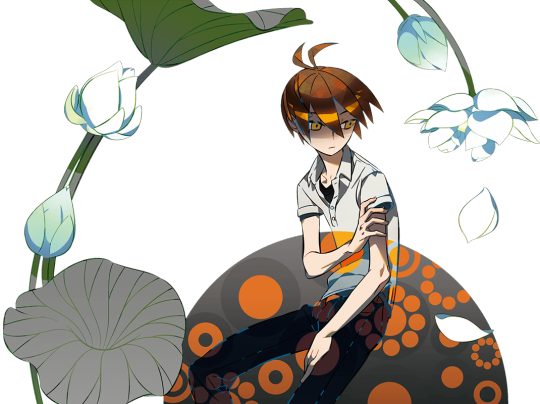
3. There ain’t no meaning, got it? - Ii (Boku)
Ii-chan is the narrator of Nisioisin’s first ever series, Zaregoto (Lit. Nonsense). It’s not really until the second book you get a grasp of his character, but Strangulation Romanticist does such an excellent job of setting up who he is as a person. This is another one of Nisioisin’s character types (narrator who feels ennui, and really, really doesn’t want to be a person).
What’s great about Iichan is that he is special in a way. Just like he’s described in the books, when he’s thrown into situations everything goes a little bit crazy. He always gets dragged into mysteries, and has people die around him even though he tries to stay as uninvolved with people as possible. He’s actually a great look at what a character constantly caught up in murder mysteries like the main character of a detective novel would actually act like. He has this deep rambling narration that sways between nihilism and existentialism that makes him a really unique character to read about.
But at the same time Iichan is also kind of a normal dude. And I don’t mean in the sense that he’s an everyman, or has no personality, but he kind of just feels like one. The great twist of No Longer Human is that Yozo isn’t some inhuman monster, he’s just kind of a normal guy who drowns out his misery by taking advantage of women. Like, it’s not all that uncommon. The same thing with Iichan, as poetic as he gets he’s kind of a very petty person and most of his flaws are very mundane ones.
It’s basically very hard to care about other people in this world. Ii-chan doesn’t want to at all, he just wants to have all of his emotional needs fulfilled by the friend he both infantilizes and puts on a pedestal. He’s just super clingy about the one relationship he has in life, because he’s afraid of losing it, but he’s also afraid of being close to her. Ii-chan is just kind of a normal person reacting badly to trauma, but he presents himself as such a mystery that most people lose sight of that (in story). He’s kind of just petty and annoying, and that’s why I love him.

4. No Longer Human - Hitoshiki Zerozaki
Zerozaki is Iichan’s greatest character foil. Basically the best way to describe it is Zerozaki is Mersault. The flip that is switched on for everyone that prevents them from killing someone when the idea crosses their mind is turned off for Zerozaki, and so he kills. He doesn’t enjoy it, he doesn’t have a particular reason to it, he just can’t overcome his impulse to kill. If Ii-chan is restrained, then Zerozaki never restrains any of his impulses at all and lives following only those.
Once again this is another common Nisioisin character archetype “A murder, but they’re sad and lonely.” What I like about Hitoshiki is how much of a deviant he is to that archetype.
He wants a friend and somebody who understands him, but at the same time he hates himself so he doesn’t want anybody too close. He lives in a family of murderers and he’s somehow the rebellious child of the family. He’s constantly running away and wandering from place to place. What makes Zerozaki interesting is how self aware he is about all of this too. He rambles his thoughts and will just be like “Yeah, so anyway that’s totally fucked up (LOL).”
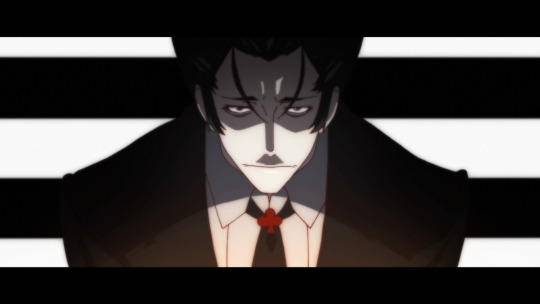
5. Is your life dramatic - Kaiki Deishuu
Kaiki is a character who I admire for his philosophy above all else. He’s another one of those “deviant” characters like Kumagawa who would just be a villain to be defeated in any other narrative, but in this one he gets fully fleshed out as a character.
What’s interesting about Kaiki is that he chooses exactly the way he lives. He decides to be a villain. Kaiki at some point sees through most of the lies of the people around them, and for how meaningless the things that you are told have value can be. He hates holding onto ideas like those.
But that doesn’t mean that Kaiki rejects everything. He doesn’t claim to see above society, or that he’s not a part of society. Rather, Kaiki just uses that awareness to realize he can give meaning to whatever he personally finds meaningful. Because it’s all meaningless anyway, as a human being he can create his own meaning.
So his want of money is not just simple greed, it’s what he’s decided to live for. Kaiki is an adult who willingly chose to become a conman because he finds that’s his place in society. He just doesn’t trust himself enough to be kind despite feeling the same desire to save others, so he decided to lie to them and trick them instead.
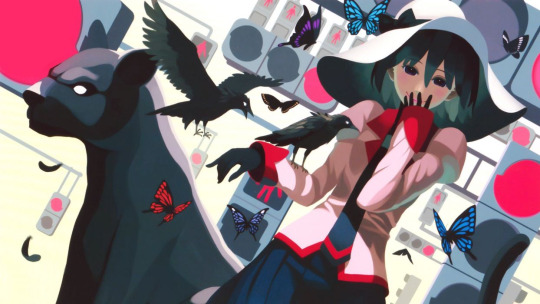
6. “I don’t know anything, you’re the one who knows” Oshino Ougi
Ougi is just interesting conceptually. They are literally Araragi’s own shadow, running away from him and given form and consciousness of their own. While Ougi themselves works as a common Jungian shadow archetype calling characters out for what they are repressing and also revealing the bare faced truth to them, which is why they are so heavily associated with mirrors, lights, and shadows.
My favorite part about Ougi however is not their connection to Araragi. It’s when Ougi starts to become their own character. An oddity with consciousness that begins to deviate from what they were made for, because they were allowed to live on their own.
Ougi did not become a fave of mine until Zoku because that was when they started to self reflect and realize their own strange existence separate to Araragi. The conversation scene with Araragi is one of my favorite in the whole series because it shows how Ougi is just a genuine tease, and a very clever and insightful person. That’s who they are, outside of just being an oddity that exists to criticize others and call out flaws. They’re ridiculous, and a little strange, and they enjoy screwing with other’s heads and messing around a bit too much. But Ougi Oshino is Ougi Oshino.
It’s just an interesting concept, to have to define who you are as a person when you were created out of all of the unwanted qualities, and insecurities of another person.

7. Why are you touching me without permission, you weed - Yasuri Nanami
Nanami is another one of those “I’m a genius and I’m good at everything but I’m secretly sad” characters, and once again what I love about her is how unlikable she’s allowed to be. None of what Nanami is capable of comes off as cool for very long. She’s basically framed and treated as a horror movie monster, always speaking in the same monotone voice. The one story that shows her true nature in chapter four is literally, paced, framed, exactly like a slasher movie with characters being hunted down and killed one by one.
Nanami’s just this horrible wretched existence that doesn’t even want to be alive. She basically acts like frankenstein’s monster, ie, the one in the book. She’s just this corpse that is barely even alive in the first place, constantly sick and in pain, and she’s also at war with herself. The part of her that wants to die and the part of her that’s lonely and wants to find some reason to live, or some connection in life are constantly at war with each other.
And as horrifying as Nanami is she also feels like the most human of Niosisin’s, super-genius characters. She’s riddled with weaknesses and flaws. She lashes out when he’s in pain, she felt bad when her parents told her to die. You get the sense that Nanami’s super genius isn’t what drove her insane at all, it was just how everybody around her treated her as some thing that was not human. Isolation made her this way. She was conditioned to act this way not born inhuman. There are characters that Nisioisin writes that are genuine sociopaths (as in the trope of an unfeeling person unable to feel human emotions), but Nanami is not one of them and so when she starts acting with sociopathic-traits in her personality it makes her all the more painfully human because we see how she’s been driven slowly to act this way.

7. *Yawns* Nezumi
Juuni Taisen is one of those death game stories where every character is defined by their one gimmick and written around their concept. In the original novel each character really only gets one chapter to be fleshed out as a character. I half suspect Nisioisin wrote it as a dare to himself on how much he could accomplish with one chapter.
The interesting part about Nezumi is his concept again. He can redo anything 100 times. You think this would make him amazing at anything in life because of his time loop ability, but physically having to live through all of those time loops exhausts him to the point that he’s too tired to do anything. You would think he could get anything he wanted out of life, but there are times he can ask a girl out one hundred times and get rejected one hundred different ways.
Nezumi is interesting because of how quietly he lives. There’s nothing he really wants out of life, and nothing he wishes for, like a rat he just scurries and survives.

9. I am currently being accused by everyone - Kakushidate Yakusuke
The same as Iichan and Kumagawa, Yakusuke is a guy who is just cursed by constant bad luck. What I like about Yakusuke is that he’s a full fleshed out character, instead of just an unlucky every dude protagonist.
He’s a contract worker who is constantly shifting between jobs. Due to this fact he’s got like 1,000 skills that he gained on his various jobs. He’s not smart, but because he’s experienced so much of life he’s incredibly resourceful. Which is why he makes a perfect counterpart and foil to Okitegami.
Yakusuke’s everyday life is him constantly being accused and blamed, and falling from one bad situation to the next. But, he has so much experiences that it’s what draws Okitegami to him who can only ever experience one day at a time because her memories will reset at the end of the day. He’s exactly my type of man, a total failure at all walks of life.

10. This is your last chance, let me make you happy! - Kugi Kizutaka
He’s so low on the list because his story “Magical Girl Ritsuka” only has one chapter published in english, but he’s so interesting he instantly became a fave. He’s actually a concept i have been looking for for a long time, which is basically what I describe as “Reverse Junko Enoshima.”
Basically someone as smart and manipulative as Junko Enoshima, who can make anybody into their toy, and predict things years in advance and control everything, but instead of using that power to send the world to despair, they use that power to give the world hope instead. Not out of any genuine good will or because they’re a good person, but because they’re obsessed with the idea of giving people happiness the same way Junko is with sending people to despair.
Kugi is a lot like that. He’s a genius ten year old who sees everybody for their potential to be used, and looks down on absolutely everyone around him. He’s made contact with a magical girl, because he’s pretty clearly planning on using her to enslave the world to him, so he can force everybody to be happy. And it’s absolutely adorable. He’s just such a genuine terrible little person while at the same time wanting to make everyone happy.
#spooky speaks#nisioisin#kumagawa misogi#ajimu najimi#iichan#iikun#hitoshiki zerozaki#kaiki deishuu#oshino ougi#yasuri nanami#kakshidate yakusuke#nezumi#kugi kizutaka#medaka box#bakemonogatari#magical girl ritsuka#zaregoto#katanagatari#Anonymous#nisio meta
209 notes
·
View notes
Note
I heard that Ougi is a pretty similar to Kumagawa? Or even better than him? I didn’t watch Monogatari, but is that really true? If it is, I might give Monogatari a try.
Ougi and Kumagawa: Shadows of the Main Character

They’re both fantastic characters, and I personally reccomend anybody reading to check out both series. Thank you for sending me this ask so I can talk about two characters I love, anon!
They’re similiar because they are both written after the same archetype. This is archetype in a Jungian sense, which means common character types that appear in almost every story. However, Ougi and Kumagawa are intentionally written that way. They are written as shadows and opposites to oppose the main characters of their respective works.
The shadow is simply the dark side of someone’s personality. And what is dark is always known only indirectly through projection. That is, one discovers his dark side as something belonging to others: friends, relatives, fictitious characters, etc. This is why the meeting with the personal shadow is considered to be a moral effort. The difficulty of integrate the shadow is huge, if we have to face alone this powerful figure.
The shadow is the first to be met when one starts his self analysis. As long as the shadow is not assimilated and controlled by the consciousness, it may appear in dreams and fantasies mingled with the anima archetype .
The black shadow may appear as an archetype too. The devil’s images and the demonic features (symbols) are very common to men’s dreams.
So in other words these are traits that are present in the main character, which the main character can never acknowledge. So they appear as being representd in another character instead, because the character expresses all of those traits instead of repressing them. It’s like a person who has violent tendencies that keeps them hidden, meeting someone who is openly violent on the surface. The theory of the Jungian shadow states that since we can only recognize these traits through projection if we are more ignorant of them, then you would be especially sensitive to seeing that trait in others.
It’s an idea that Nisioisin has played with a lot even since his second novel, where he presents the serial killer who is the same but also the complete opposite as the main character who acts as a detective solving murder mysteries.
Maybe it was a very primal experience. The very first word we ever heard. A record to be termed our roots.A past to be likened with associations. Vectors with identical origins and directions.As if to precede the everyday. As if reflected in a mirror. That is to say,I think we were similiar. “Zaregoto vol 2″
These mirror like characters who seem to be polar opposites but at the same time, they reflect each other. Because internally they are the same but one of them chooses to repress, and the other chooses to express.
The shadow is associated with primal, instinctual feelings that we ourselves are unaware of most of the time. The shadow is what we ourselves do not acknowledge, but at the same time the shadow needs to be acknowledged to be a full fledged person.
They are associated with shadows because they are hidden and yet always with me. The shadow cannot exist without a light being cast on it, but it inevitably exists in tandem with the light. They are associated with mirrors, because the shadow unconsciously reflects.

Mirrors, shadows.Broken glass, a warped reflection.
Therefore we see both the confrontation between Araragi and Ougi, and the conforntation between Kumagawa and Zenkichi/Medaka. Ougi and Kumagawa, respectiely, are both playing the shadow to their respective protagonists. They are trying to force the other characters to understand.
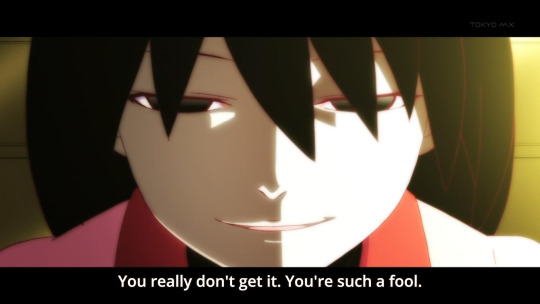
2. Confrontation
To elaborate on this point let’s look at two scenes on confrontation. Kumagawa Misogi is the dark side of Medaka’s good intentions, and Zenkichi’s struggles to be stronger.
Zenkichi is heroic in his violence. He fights to protect others. Him getting into fights or acting with violence is never a bad thing. Kumagawa is villainous in his violence, when he fights he’s always framed as horrifying and twisted. Zenkichi fights honestly, Kumagawa uses dirty tricks to win.
Medaka trying to make everyone happy is never shown as a bad thing this far in the manga. If people don’t want to be happy, they’re obviously wrong. Kumagawa however, is framed as wrong and horrible for wanting to make everyone miserable. Even though both of their goals are distinctly inpersonal, loving everyone and hating everyone, it’s just projecting a feeling on a mass of people. Neither of them really love or hate anyone in particular because they’re both so distant from other people, so inhuman.
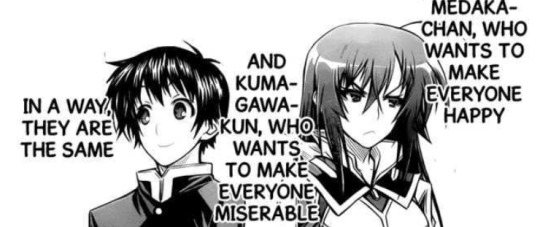
Kumagawa represents a part of Medaka and Zenkcihi that neither of them want to confront or acknowledge. In a twisted way the whole minus arc is Kumagawa trying to get them to understand his suffering, that there is no good way to suffer, that there are no such thing as good or bad victims instead of the simple and beaufiful thing that Medaka sees as saving others most victims are in fact ugly.

Medaka can’t understand why Kumagawa would want to lash out and hurt other people, why he’s looking for someone to blame for his misery, but she doesn’t understand that right now he sees the only other option is just shutting up and taking it. Which he has been doing his whole life and what drove him insane to this point. She doesn’t get that there’s no good way to suffer.

Kumagawa is even saying that he’s trying to get people to feel what he feels. That is he’s playing shadow, he’s making his suffering which is mostly unacknowledged plain for all to see. And Medaka doesn’t want to look at him, she wants to look away and keep being blind to the shdaow.

The next chapter is even titled “it’s about accepting”, and Kumagawa says that if Zenkichi were to accept the same amount of negative things that happened in his life, that Zenkichi would have turned out like him.And we see once again, Zenkichi rejects him. Someone like Kumagawa was never in his sight to begin with, he does not understand him, he does not want to understand him, he is completely blind to his shadow.
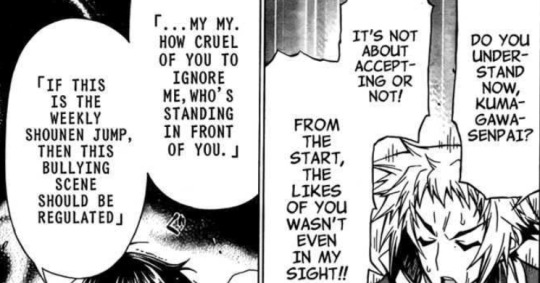
Ougi does the same, he confronts Araragi about his own reckless behavior. Ougi believes the same things that Araragi pretends not to know but otherwise represses.
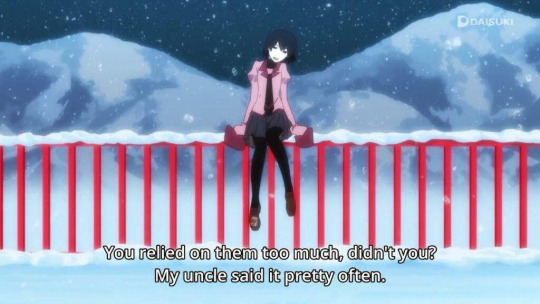
However, you haven’t read monogatari so I won’t spoil the whole arc for you. Ougi confronts Araragi in three different situations, basically trying to convince Araragi to try to solve everything on his own rather than depending on others.
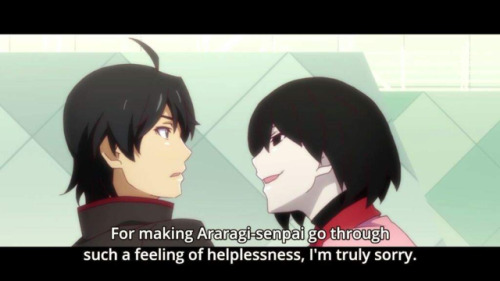
They confronts Araragi with his own repressed self hatred, and feelings of inadequacy that he spends all of his time repressing. Ougi the same as Kumagawa is presented as someone Araragi has to accept to become a whole and complete person.
Though, they are same in archetype they’re almost completely different in character. Kumagawa does everything himself, he fights. He doesn’t plan ahead for anything and instead relies on his own cleverness, and his way to bluff and guess his way through situations. Ougi is intelligent, and often works by manipulating other people through the shadows and pulling on strings. He’s good enough at reading people on an intellectual level to predict them. Ougi is all intellectualism, he’s all logic, whereas Kumagawa is raw emotion, he tends to do everything based off of his own personal feelings which is why he ends up acting so chaotic because those feelings themselves are illogical. Kumagawa is pure empathy, and he gets along with other people shockingly well and basically just acts like a normal dude when he’s not trying to be the worst. Ougi is defined by how abnormal they are, they can’t not act abnormal. Every conversation they have with someone they unnerve them. Even when they’re not trying to, they act suggestive, and overly polite while at the same time being intrusively creepy, like they’re stuck in permanent spooky ghost mode.
They also believe completely opposite things. Kumagawa believes the world is entirely meaningless and chaotic, and therefore lacking in order. He instinctually rejects all meaning and order. He’s obsessed with being wrong, accepting what is wrong, what is rejected, because he knows there’s no such thing as what’s right.
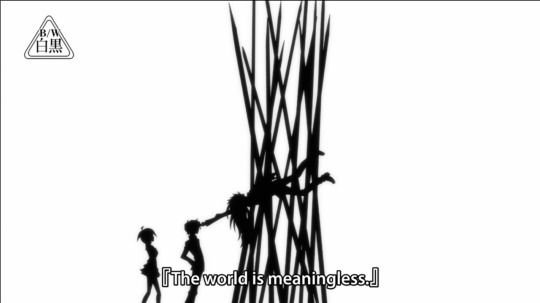
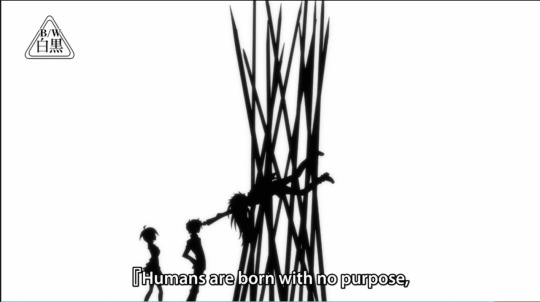
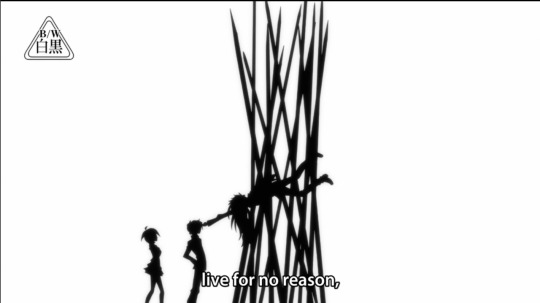
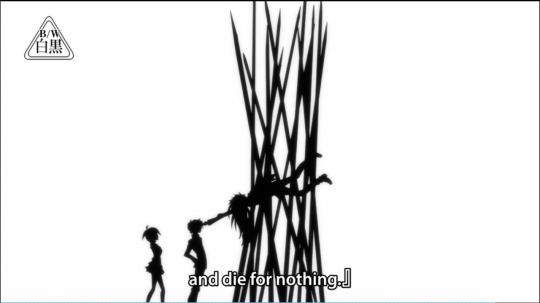
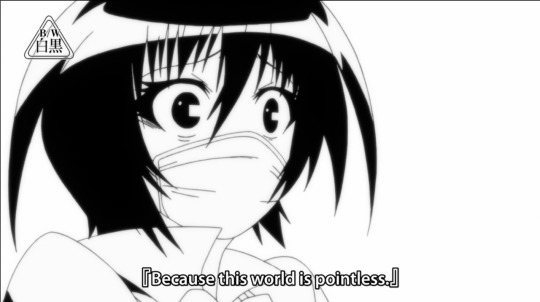

Ougi is the opposite. Kumagawa would reject everything Ougi believes in. Ougi believes that there is a pre-supposed order of the world. That there is a way things are supposed to be. They believe n rightness, and that you have to strive for the right way to do things.


Ougi wants things to be neat, proper, and orderly. In other words Ougi represents the idea of fairness, justice, balance. Kumagwa believes in unfairness, injustice, and that things are funadmentally out of balance. Kumagawa embraces the disorder of everything around him, whereas Ougi tries to force things to become more correct as they see fit. Ougi is trying to fix everyone on the right path, Kumagawa wants to throw things into chaos.
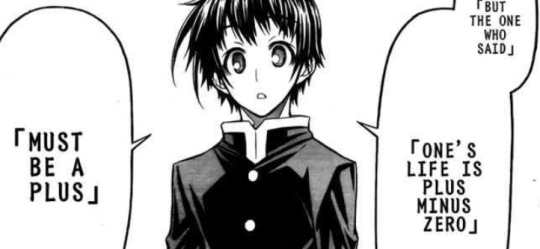

So while the same archetype they are actually pretty different as people. I don’t think it’s that important which one is better or worse because they’re both reflecting different ideas in the first place. If you enjoyed Medaka Box, then you would likely enjoy Monogatari as well! I reccomend everybody check it out.
The more you read of Nisioisin’s works the better, and if you have any questions feel free to send them in my inbox!
41 notes
·
View notes